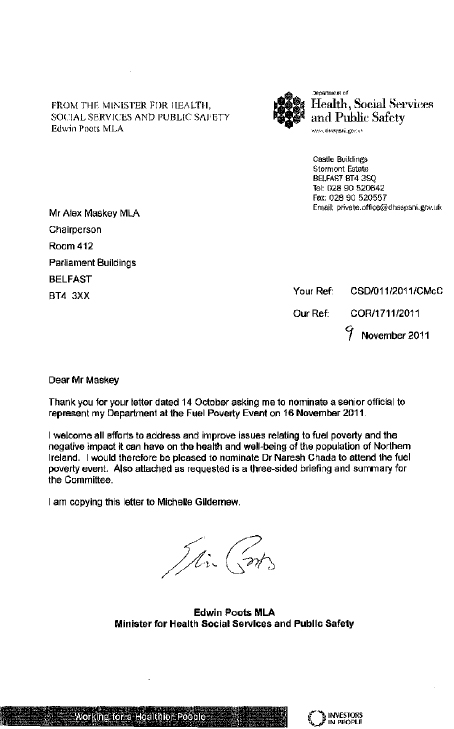Report on Fuel Poverty
Session: 2011/2012
Date: 17 May 2012
Reference: NIA 36/11-15
ISBN: 978-0-339-60425-4
Mandate Number: 2011/15 Second Report
NIA_36_11_15.pdf (5.33 mb)
Committee for Social Development
Mandate 2011/15 Second Report
Report on Fuel Poverty
Together with the Minutes of Proceedings
of the Committee relating to the Report
Ordered by the Committee for Social Development to be printed 17 May 2012
Report: NIA 36/11-15 (Committee for Social Development)
Membership
The Committee has 11 members including a Chairperson and Deputy Chairperson and a quorum of 5.
The membership of the Committee since 23 May 2011 has been as follows:
Mr Alex Maskey (Chairperson)
Mr Mickey Brady (Deputy Chairperson)
Ms Paula Bradley [1]
Ms Pam Brown
Ms Judith Cochrane
Mr Michael Copeland
Mr Mark H Durkan
Mr Alex Easton
Mr Fra McCann
Mr David McClarty
Mr Alastair Ross [2]
[1] With effect from 20 February 2012 Ms Paula Bradley replaced Mr Gregory Campbell
[2] With effect from 26 March 2012 Mr Alastair Ross replaced Mr Sammy Douglas
Table of Contents
Report
Issues for Consideration by TAGS
Appendix 1
Appendix 2
Appendix 3
Appendix 4
Appendix 5
Preface
The Department for Social Development has a central role in tackling fuel poverty. As far back as 2007 the then Inter-Departmental Group on Fuel Poverty stated:
"….. DSD has the lead responsibility for tackling fuel poverty, a role which involves the coordination of information, engagement with departments and other organisations that influence the factors which contribute to fuel poverty and more directly, through the provision of funding for and oversight of the Warm Homes Scheme" .[1]
That lead role continues today but it is recognised that there is need for a more collaborative, cross-departmental and cross-sectoral approach in order to address fuel poverty. The new fuel poverty strategy states:
"…. other departments also have a significant role to play in the eradication of fuel poverty. There are clear links to other government strategies including the Northern Ireland Strategic Energy Framework, the Green New Deal, the Sustainable Energy Initiative, and the forthcoming new Child Poverty Strategy. Closer working, not only between government departments, but between government and the private and voluntary sectors is vital. There is a strong body of evidence that partnership working is the best way to tackle fuel poverty. We will work with other government departments, the voluntary sector, the energy sector and others who are committed to alleviating fuel poverty".[2]
In light of this, the Committee for Social Development convened a stakeholder event comprising relevant government departments, Non-Governmental Organisations (NGOs), statutory committee chairs and stakeholders from the public and private sector to identify potential solutions to fuel poverty and a mechanism to take these forward.
Executive Summary
The factors that contribute to fuel poverty have been widely reported and debated yet despite this little progress appears to have been made to prevent or reduce fuel poverty in Northern Ireland.
The Committee recognises the frustration of stakeholders regarding the fragmented approach to address fuel poverty and sympathises with the call for action.
The Committee saw its fuel poverty event as a first step to consider how statutory committees, government departments, the private sector and NGOs could work together to prevent and reduce fuel poverty.
It is clear to the Committee that:
- bridging the gap between identifying solutions to fuel poverty and implementation of those solutions is going to require innovative thinking;
- elimination of fuel poverty is going to require a long-term strategic policy approach; and
- 'quick fixes', while necessary to address short-term pressure points, are not the answer.
Therefore, the Committee agrees, despite the evident frustration among stakeholders, that the solutions proposed at the fuel poverty event require further and urgent consideration.
The Committee strongly advocates a strategic approach to dealing with fuel poverty based on a time-bound, 'thematic action group' (TAG) approach.
While further discussions with the Department and stakeholders are necessary the Committee envisages a key role for thematic action groups working alongside the Cross Sectoral Fuel Poverty Partnership, recently established by the Department for Social Development.
Introduction
1. A household is said to be in fuel poverty if it needs to spend more than 10% of its income on fuel to maintain an adequate level of warmth. In Northern Ireland, it is widely agreed that the rate of fuel poverty is among the worst in Northern Europe. The most recent official estimate puts the rate of fuel poverty here at 44% of households (NIHCS, 2009).[3]
2. Fuel poverty can disproportionately affect those on low incomes, ill families with infants and young children, and older people.
3. Recent statistics indicate that the excess winter mortality index in NI is around 15-20% in most years. While these deaths cannot be wholly attributable to fuel poverty it is undeniable that not being able to afford to heat one's home is a contributing factor to ill-health and has potentially life-threatening implications for older people. Based on the most recent Surgeon General's Annual Report for Northern Ireland it can be estimated that there have been 1,890 excess winter deaths in the last decade which are directly attributable to people living in cold and damp homes (Morris & Liddell, 2011).[4]
4. It was in this context that the Committee decided to host a stakeholder event to focus specifically on potential solutions to fuel poverty.
5. To maintain a sharp focus on outcomes the event was structured around the membership of the then Inter-Departmental Group on Fuel Poverty (IDGFP). This Group was comprised of representatives of 8 Executive departments tasked with developing strategy and actions to address fuel poverty.
6. The Committee therefore decided to invite officials from each of these departments to attend the event to summarise their department's role in addressing fuel poverty and to take part in discussions with stakeholders.
7. Furthermore, recognising that fuel poverty was an inter-committee issue the Committee invited the Chairs of each of the other seven statutory committees whose departments were represented on the IDGFP to 'host' a table of officials and stakeholders and chair those discussions. The aim was to initiate a collegiate approach to address this multi-faceted problem.
8. Thirty-three stakeholder organisations were also invited to attend the event.
9. Submissions from Executive departments and stakeholders which formed the basis of discussion are in Appendices 2 and 3 respectively.
Key Recommendations
10. The Committee recommends that the Department for Social Development establish an Overall Action to address fuel poverty.
11. The Committee recommends that this Overall Action should be: Reducing and Preventing Fuel Poverty – a coordinated and collaborative approach.
12. The Committee recommends that Thematic Action Groups (TAGs) are established and are based on themes identified as a result of the discussions on the night of the fuel poverty event.
13. The Committee recommends that the key role of each TAG will be to identify and prioritise agreed workable and realistic solutions to fuel poverty and not to develop 'wish lists'.
14. Concerned about the potential for TAGs to be considered a 'talking shop' the Committee recommends that each TAG publishes a work-plan which details specific actions to be undertaken. The work of each TAG should not exceed 6 months.
15. The Committee recommends that Joint Thematic Action Group events are held every 3 months to advise TAG members of developments in all the groups and to generate co-ordinated thinking across the TAGs.
16. The Committee recommends that each TAG reports to the recently established Cross Sectoral Fuel Poverty Partnership on initiatives they recommend for implementation and that the relevant statutory committees are advised of progress every two months with a final report delivered after 6 months.
17. The Committee recommends that the role of the Cross Sectoral Fuel Poverty Partnership should be to coordinate a strategic approach to the implementation of effective fuel poverty initiatives arising from the work of the TAGs.
18. The Committee recommends that the Cross Sectoral Fuel Poverty Partnership monitors progress of the implementation of these initiatives and makes quarterly reports to the relevant statutory committee on those programmes for which committees have a statutory responsibility to scrutinise.
19. The Committee acknowledges that the membership of the Cross Sectoral Fuel Poverty Partnership has already been established. However, in light of the Committee's report the Committee recommends that membership of the Cross Sectoral Fuel Poverty Partnership is reviewed and suggests the following composition:
- Chair - Minister for Social Development;
- Permanent Secretaries of each relevant department; and
- Chairs of each TAG.
In addition, other expert groups or individuals should form part of the Cross Sectoral Fuel Poverty Partnership on an ad hoc or continual basis to bring insight and objective consideration to the proposed actions.
Principles for Working
20. It is essential that the work of both the TAGs and the Cross Sectoral Fuel Poverty Partnership is transparent and based on shared information and timely communication.
21. The Committee feels that the Cross Sectoral Fuel Poverty Partnership has the potential to act as the group with responsibility for overseeing the strategic implementation of the initiatives developed by the TAGs but such a group must command the confidence of TAG members.
22. In the Committee's view, if the Cross Sectoral Fuel Poverty Partnership does not have specific terms of reference, is unclear about its powers and cannot take decisions on implementation of solutions developed by the TAGs, then it is not fit-for-purpose and will not command the confidence of stakeholders or the Committee.
23. Objective, evidenced-based decision-making is critical if both the TAGs and the Cross Sectoral Fuel Poverty Partnership are to have credibility and integrity and if they are to avoid sectoral interests directing outcomes.
Consideration of Process
24. The Committee suggests that the membership of each TAG should be established by self-nomination of stakeholders to a specific TAG and also include departmental officials.
25. The Chairperson and Deputy Chairperson of the TAG should be elected by the membership of each specific TAG.
26. The thematic groups outlined in Appendix 4 are to highlight the potential to ensure a comprehensive and strategic consideration of these issues and to develop real, achievable outcomes. It does not preclude the discussion of other relevant issues that stakeholders bring to the table under a particular theme nor indeed does it preclude a different combination of departments under a specific TAG.
Conclusions
27. It is evident that stakeholders feel there has been an absence of a joined-up approach to address fuel poverty. A key demand of stakeholders was the need for a much more coherent, strategic and collaborative approach to address fuel poverty. This must include a greater alignment of policies with associated verifiable targets. The Committee believes that its proposal can help achieve this.
28. It is evident that although there is no shortage of suggestions as to how fuel poverty can be addressed it is not clear which of these is feasible. The Committee strongly feels therefore that it is necessary to establish a time-bound, cross-sectoral and cross-departmental approach to establish the appropriate actions to be taken to address fuel poverty.
29. The Committee believes that the number and the composition of thematic action groups should be determined by the stakeholders and to that end the Committee is willing to engage with stakeholders and the Department to further develop these ideas. However, the Committee provides an example of possible options in Appendix 4.
30. The Committee believes that the work of both the TAGs and the Cross Sectoral Fuel Poverty Partnership should focus on identifying and implementing practical and realistic actions to reduce and prevent fuel poverty and that these should be based on clear, objective evidence.
Issues for Consideration by TAGS
31. A wide range of solutions were suggested which the Committee believes indicates a need for the type of thematic and inter-departmental approach outlined above.
32. Key underlying issues identified could be grouped into the three broad areas which are at the root of fuel poverty: the cost of energy, low incomes and energy efficiency.
33. Increasing income levels for those in fuel poverty is key to its eradication. This requires a multi-faceted approach but maximisation of benefit uptake and access to grants will form a large part of this. The Committee acknowledges the recent benefit uptake campaign by DSD but stakeholders believe that more needs to be done to maximise benefit uptake. Given that the DSD will be informing all of its customers about the changes to benefit payments as a result of welfare reforms the Committee believes that this could offer an opportunity for DSD to review how it can communicate with customers to ensure that they receive all the benefits they are entitled to. DSD should therefore develop a benefit maximisation campaign in association with the expected welfare reform information that claimants will receive.
34. There was a clear position that automatic payment of Pension Credit would be a major step forward to help older households pay for rising energy costs. It was suggested that there should be greater emphasis on encouraging people to access non-governmental/non-statutory bodies for benefit checks.
35. There should be a discussion on whether it would be better to pay the Winter Fuel Payment as a credit to either a household's electricity or gas bill or as a credit towards household oil rather than being paid in cash.
36. The Advice Sector also has an important role to play in providing advice on how households can be more energy efficient but consideration should be given to how this sector can work with the energy suppliers to ensure that consumers have greater confidence in advice given by the suppliers and that the advice is consistent. For example, this could be in the form of literature on energy efficiency produced by suppliers being endorsed by an independent advice organisation such as Energy Savings Trust or Bryson Energy. This could also be coupled with advice on maximising benefit uptake e.g. pilot of the firmus Energy Efficiency Support Package taken forward by Bryson Energy. This approach should also highlight the potential carbon savings to be made and how this contributes to carbon reduction targets and sustainability.
37. Consideration should be given to how community outlets e.g. pharmacies, can be utilised to provide advice on maximising benefits/energy advice.
38. The impact of welfare reform on benefits was a recurring issue with the over-riding concern that the expected changes would make fuel poverty worse. Welfare Reform should be factored into estimations of fuel poverty so that a strategic approach addresses the potential increase in the number of households in fuel poverty as a result of these changes.
39. There should be a greater focus by energy suppliers and relevant departments on educating consumers about energy efficiency and how this can reduce fuel bills. In particular all relevant departments must acknowledge and accept greater responsibility to quickly consolidate energy and efficiency policy. Consideration should be given to establishing one body with responsibility for this as per the ETI Committee's Renewable Energy Inquiry.
40. There should be greater transparency and accessibility of information in relation to the debt management policies of energy companies.
41. While it is acknowledged that there are a range of licensing conditions to protect consumers there was a need for a review of these, particularly those aspects relating to disconnections and the unfair repayment of debt.
42. A number of schemes are currently in operation to facilitate more flexible payment of home heating oil. These include oil saving stamps and innovative credit union initiatives. Consideration should be given to if/how these could be made more mainstream.
43. The results of DSD's 'Pay-as-You-Go' oil scheme should be made available as soon as possible. If these are positive, consideration should be given to how this can be rolled out to a wider consumer base.
44. Consideration could be given to the proposal for the regulation of the home heating oil industry. The Committee notes the recent debate in the Assembly on this issue. However, it must be clear what regulation actually means. It suggests regulation of price but it was not clear if this was possible given that global oil prices are beyond the control of the Executive. Any consideration of this issue must therefore be based on clear, unambiguous and independent data regarding the cost of oil to the distributor and the subsequent cost to the customer. Regulation should be explored to determine what impact, if any, this would have on fuel poverty.
45. In the same context, many people rely on expensive small volumes of oil, usually 20 litre drums, in order to see them through a short cold period. The oil industry needs to consider how it will address the current requirement for a minimum delivery of oil.
46. Consideration should be given to the energy brokerage scheme developed for Housing Executive tenants to determine if there is potential for this type of scheme to be adopted by other organisations that could act as brokers.
47. To address the ability of people to pay for oil the role of lending institutions, such as credit unions, to provide short-term fuel-specific loans should be investigated. For example, an institution could establish a Fuel Loan Scheme. Under this an individual could establish a £500 loan capacity specifically for oil. The oil distributor could then be paid by the credit union directly from this account on presentation of a signed customer receipt. This would ensure the loan went directly to pay for fuel.
48. It should be determined whether social tariffs are feasible and what impact they would have on fuel poverty. For example, the Warm Home Discount Scheme which operates in GB provides a £120 rebate on a person's electricity bill subject to certain eligibility criteria. The Committee recommends an in-depth analysis of the efficacy of such a scheme in Northern Ireland.
49. As suggested in Power NI's submission the lack of 'hedging' options for electricity suppliers means that the cost of a social tariff would be pushed on to the customer. In consideration of social tariffs therefore, consideration must be given to the type and range of 'hedging' options that are available and whether they are feasible in a NI context.
50. The role of Councils in addressing fuel poverty at a local level should be considered and incorporated into the strategic approach outlined above. Consideration should be given to the development and implementation of local action plans within a council area to address fuel poverty. These could have the advantage of targeting specific areas e.g. those areas identified as being in severe fuel poverty.
51. Analysis of best practice should inform such plans. In that respect the Maximising Access in Rural Areas (MARA) project managed by the Public Health Agency deserves consideration.
52. The potential for an area-based approach should be considered in the context of Professor Liddell's on-going research for the Department of Social Development.
53. Building regulations, in respect of energy efficiency, should be improved as per the public consultation (Conservation of fuel and power) but by a minimum (as opposed to an average referred to in the consultation) of 25% and these should apply to both social and private housing developments. Assuming agreement by the Committee for Finance and Personnel, the Minister for Finance and Personnel should seek to ensure these that these come into operation this year.
54. Relating to this is the requirement to produce an Energy Performance Certificate (EPC) which helps homeowners understand the energy efficiency of a home. However, consideration should be given to introducing legislation that requires either a landlord or owner to bring a house up to the levels required under the revised building regulations noted above before they can rent or sell the property. This would apply to new builds right away and to existing housing stock from a date in the future that gives sufficient time for owners and landlords to comply. As an incentive to achieve the highest EPC standard a one-off rate reduction could be offered to landlords/owner occupiers if achieved by a certain date.
55. Consideration should be given to the forthcoming EU Directive on Energy Efficiency, the implications for statutory bodies and any associated targets.
[1] DSD (2007) Tackling Fuel Poverty: A Strategy for Northern Ireland. Inter-Department Group on Fuel Poverty, Annual Report 2007, p9
[2] DSD (2011) Warmer, Healthier Homes: A New Fuel Poverty Strategy for Northern Ireland, p36
[3] Northern Ireland House Conditions Survey, 2009
[4] Morris, Chris and Liddell, C (2011) Chapter 2: Seasonality of Mortality in Northern Ireland: A preliminary review.
Appendix 1
Minutes of Proceedings
Thursday 17 May 2012
Room 29, Parliament Buildings
Present: Mr Alex Maskey MLA (Chairperson)
Mr Mickey Brady MLA (Deputy Chairperson)
Ms Paula Bradley MLA
Ms Pam Brown MLA
Ms Judith Cochrane MLA
Mr Michael Copeland MLA
Mr Mark H Durkan MLA
Mr Alex Easton MLA
Mr David McClarty MLA
Mr Alistair Ross MLA
In Attendance: Dr Kevin Pelan (Assembly Clerk)
Mr Stewart Kennedy (Assistant Assembly Clerk)
Mr Neil Sedgewick (Clerical Supervisor)
Ms Allison Ferguson (Clerical Officer)
Apologies: Mr Fra McCann MLA
10:04am The meeting began in closed session
1. Fuel Poverty Report
10:11am Mr Alex Easton joined the meeting
10:15am Ms Judith Cochrane joined the meeting
10:17am Ms Pam Brown joined the meeting
The Committee considered the Draft Fuel Poverty Report.
A minor amendment was agreed to paragraph 44.
Question put and agreed:
That the Report be the Second Report of the Social Development Committee to the Assembly
Agreed: The Committee agreed the following draft motion for debate in the Assembly:
That this Assembly approves the Report of the Committee for Social Development on Fuel Poverty NIA 36/11-15; and calls on the Minister for Social Development to implement its recommendations to ensure a strategic, cross-departmental and cross-sectoral approach is adopted to reduce and prevent fuel poverty.
[EXTRACT]
Appendix 2
Departmental Submissions
Department for Agriculture and Rural Development
Annex B
Briefing for DSD Committee
- DARD's 2008/11 Rural Anti-Poverty and Social Inclusion programme, has made a positive impact on the lives of some of the most vulnerable in our society. In the 3 year period of the Programme, over 15,000 rural people have benefitted from various initiatives, including:
- 700 rural homes received home insulation and central heating systems through the DARD intervention facilitating the 'top-up' of the DSD Warm Homes Scheme in 2008/09.
- During the 09/10 Financial Year, DARD in collaboration with DSD and NIE funded the insulation of 300 rural homes on low incomes that could not be supported through the new 'Warm Homes Scheme' - none of which would have been assisted had DARD not made funding available.
- During the last financial year (10/11) DARD worked with DSD and the new Warm Homes Scheme Implementation agents (Bryson Charitable Group and H&A Mechanical) to assist the targeting of "hard to reach" rural dwellers.
- DARD also increased the number of rural referrals to the DSD Warm Homes and Insulation Schemes through the Maximising Access to Grants, Benefits & Services Project. Over 1,500 referrals have resulted from the Maximising Access Project and 560 rural householders have benefitted to date. The number of beneficiaries is set to increase as referrals work their way through the system.
- A further £16 million has been allocated to addressing poverty and social isolation in rural areas in this current budget period. DARD officials are developing a number of measures to tackle rural poverty and are engaging with stakeholders and other Departments (such as DSD on Fuel Poverty) to bring forward initiatives that will help those experiencing poverty and social isolation.
Key Issues
- DARD is committed to taking action to address the difficulties facing rural areas and to improving the quality of life of rural dwellers and wish to continue to work with key stakeholders to ensure that action is taken to target fuel poverty in rural areas.
- DARD is keen to ensure that any solutions aimed at addressing fuel poverty as a whole take account of the very unique and specific nature of rural areas.
- DARD is concerned about the impact that rising fuel costs are having, particularly on the vulnerable in rural areas who are limited in the choice of fuel that they can avail of and do not have access to cheaper alternatives such as mains gas.
- DARD would welcome proposals to address rural fuel poverty from across departments and stakeholders and is keen to play its collaborative role.
Department for Employment and Learning –
Fuel Poverty Contribution
Background
1. The new Fuel Poverty Strategy, 'Warmer Healthier Homes' focuses strongly on removing energy inefficiency as a cause of fuel poverty, opens new ground on fuel prices, while exerting influence on other departments to help tackle prices and low incomes. It identifies 4 key areas for action to tackle fuel poverty in the future:
- Targeting of Resources
- Improving Energy Efficiency
- Achieving Affordable Energy
- Building Strong Partnerships
2. 'Maximising Incomes element of Key Area 3 - 'Achieving Affordable Energy' acknowledges that 'the downturn in the global and local economy make increasing household incomes very challenging. The Department [DSD] is limited in the actions it can take to maximise incomes and other government departments also have limited provision for increasing and maximising incomes'.
3. The 'Warmer Healthier Homes' Strategy lists the following practical ways of increasing and maximising household incomes:
- Benefit uptake
- Automatic payment of Pension Credit
- Oil stamp saving schemes
- Achieving affordability through renewable and sustainable sources
- Social tariffs
DEL's Contribution
4. The Department for Employment and Learning continues to "promote learning and skills, to prepare people for work and to support the economy". While of the 18 specific Actions listed against the 4 Key Areas identified in the Fuel Poverty strategy, none directly relate to DEL core business, the Department's contribution to reducing or preventing fuel poverty is focussed on its core remit of getting people back into work, raising individuals' skill levels and upskilling those in work to improve earning capacity.
5. The Department's membership of the Inter Departmental Group on Fuel Poverty is largely because of the impact of employment on those who might fall into the fuel poverty group and from a Departmental perspective, increasing earning capacity will assist in decreasing the impact of fuel poverty, though it will have limited overall impact on the more specific Fuel Poverty issues. Also of interest, however, is the fact that at present our universities are carrying out research work in a range of areas relevant to the Fuel Poverty agenda.
6. The Economic Downturn has impacted on many employers and employees in Northern Ireland. DEL has adapted its programmes and services to meet changing and increasing demands in order to provide opportunities for people to acquire the skills and knowledge to enable them to better access work, when the economic climate improves.
Department for Enterprise Trade and Investment
Briefing for Social Development Committee
Energy Policy
Energy policy in Northern Ireland is driven to a large extent by wider United Kingdom and European Union policy. Over recent times the focus of energy policy worldwide has shifted towards addressing concerns about security of energy supply and tackling the threats posed by climate change. Therefore in setting out Northern Ireland's strategic energy goals it is important to consider the European Union vision of a single European energy market alongside its overarching objective of seeking to decarbonise the European Union energy mix.
The targets the European Union has set for Member States are challenging and include a minimum cut of 20% in greenhouse gases by 2020, with the United Kingdom setting itself the aim of achieving an 80% cut from 1990 levels by 2050. Specifically, the latest European Commission Renewable Energy Directive has set the United Kingdom a challenging 15% target for the amount of total energy (across electricity, heat and transport) that should come from renewable sources by 2020.
Northern Ireland is currently dependent on imported fossil fuels for most of its energy needs. This poses many risks as we have little control over security of that energy supply and are exposed to the volatility of world energy prices. The Executive has therefore agreed the need to move away from our dependence on fossil fuels and to ensuring that Northern Ireland has a secure and sustainable energy future. Hence the Strategic Energy Framework (SEF2010), while acknowledging the environmental and cost challenges these present, has confirmed that Northern Ireland will seek to achieve 40% of its electricity consumption from renewable sources and 10% renewable heat, both by 2020.
Energy Regulation
The Northern Ireland Authority for Utility Regulation carries out its work in line with statutory duties set out in the Energy (Northern Ireland) Order 2003 and Electricity (Single Wholesale Market) (NI) Order 2007, and is responsible for regulating the electricity, natural gas (and water) industries in Northern Ireland.
The legislation clearly confers the function in relation to tariff setting on the Regulator as the expert body. The legislation requires the Regulator to carry out his functions in this area in a way that is independent of Government but regulation must be developed with regard to Ministerial policy. The Utility Regulator does not report to DETI – it is a non-Ministerial government Department that is accountable to the Northern Ireland Assembly through financial and annual reporting arrangements.
The Utility Regulator takes an active role in scrutinising and approving retail energy tariffs of the incumbent suppliers, which are the final prices customers pay. Where monopoly conditions exist in elements which make up the final energy tariff, or where a competitive market has not been fully established, it is important for the Utility Regulator to carry out this detailed scrutiny.
It must also be recognised that the regulatory system in Northern Ireland is quite different from that in Great Britain and the Republic of Ireland. Northern Ireland does not have the level of confusion around energy regulation that currently exists in Great Britain and which led to the recent Ofgem probe of the GB retail market. This was concerned with the more than 400 domestic retail tariffs in GB. In Northern Ireland the position is quite different as we have a much simpler and more transparent tariff structure, plus regulation, as reflects our less mature competitive market.
Single Electricity Market (SEM) and Competition
Fuel prices in Northern Ireland (oil, petrol and diesel) respond to fluctuating wholesale prices that are set internationally and are outside the control of DETI and government as a whole. In addition, while DETI has no direct role in the setting of electricity and natural gas tariffs, officials work closely with the Utility Regulator and the energy industry to establish, where possible, measures to put downward pressure on prices.
Among the tangible steps taken to achieve this has been the opening to competition of the gas supply market in Greater Belfast and the electricity supply market across Northern Ireland. The creation of the Single Electricity Market (November 2007) has also provided greater transparency and an increased number of electricity suppliers in the retail market, thus acting to put downward pressure on retail electricity tariffs. As at end October 2011, in addition to Power NI, the incumbent supplier, Airtricity has some 70,000 customers, Budget Energy some 3,600 customers, Electric Ireland is soon to enter the market and Firmus have confirmed that they hope to enter the market as a dual fuel provider in the second half of 2012.
Gas Network Extension
DETI has been encouraged by the ongoing work of Phoenix Natural Gas in the Greater Belfast gas licensed area and of firmus energy in the 10 towns licensed area outside Belfast to provide new natural gas networks and connect new customers. The Department recognises the great benefits to be gained from bringing gas to new areas, including greater fuel choice, enhanced security of supply, reduced CO2 and other emissions, lower business costs, pre-payment gas meters to help with alleviating fuel poverty and the employment benefits from gas extension.
A twelve week DETI consultation inviting views on the potential for extending the natural gas network to areas currently without gas, such as the West of Northern Ireland and East Down, recently closed. The Department is currently taking stock of the responses and will be providing Minister Foster and the Enterprise, Trade and Investment Committee with a report on the views proffered.
Ultimately, further extension of the natural gas network will depend largely on the availability of sufficient gas loads in respective towns and the willingness of a gas company to undertake the construction of the new network. Extension of the gas network will therefore only be considered where it is proven to be both economically and technically feasible to proceed.
Mutualisation of Energy Assets
Mutualisation of energy assets such as the Scotland to Northern Ireland gas pipeline, the Moyle electricity interconnector and the Belfast gas transmission pipeline has also helped to reduce costs to gas and electricity consumers, through the use of profits and reserves to help off-set energy costs. Mutual Energy, which holds these important energy assets has also become involved in work to develop an underground gas storage facility at Larne Lough and has committed finance to a renewable energy fund. There is also potential for other key energy assets to be mutualised in Northern Ireland and these could include other gas transmission pipelines.
DETI Actions Aimed at Improving Energy Efficiency
DETI has also taken a number of actions aimed at improving domestic energy efficiency, one of the main contributors to fuel poverty. These include:
(i) Voluntary Energy Services Agreements with all major energy suppliers (electricity, coal, oil, gas and biomass) in Northern Ireland. These agreements are part of the implementation of the Energy End Use Efficiency and Energy Services Directive. Energy suppliers have agreed to deliver an enhanced range of energy services to small business and domestic customers with a view to realising 1% energy savings per annum up to 2016;
(ii) In February 2010, DETI made the Electricity and Gas Billing Regulations which require electricity and gas suppliers to supply domestic consumers with comparable historical consumption data on their bills. The data is presented either graphically or in tabular form to allow consumers to easily monitor and compare their energy consumption year on year;
(iii) DETI is working closely with the Utility Regulator on a cost benefit analysis for Smart Meters. This analysis is to comply with the European Union IME 3 Directive. GB has already committed to a Smart Meter rollout by 2020, but to date, and until the cost benefit analysis is completed, Northern Ireland has not yet publicly committed to a Smart Meter roll out. In the meantime, the Utility Regulator has two smart meter trials at the early stages. The first is focused on technology and smart grid application, being lead by NIE in the Coleraine area incorporating approximately 200 customers. The second relates to the customer behaviour and education element and is being lead by University of Ulster. Specifically this trial focuses on how smart meters could help customers vulnerable to fuel poverty (by provision of useful information on consumption). There are approximately 120 customers involved in this trial;
(iv) Combined with Smart Meters, Smart Grid can provide digital communications between electricity consumers and suppliers, thus helping to save energy and increase reliability of electricity supply. Smart Grid can also mean that network faults and overall reliability are more effectively managed. As the Northern Ireland electricity grid is strengthened and improved, opportunities will be taken to consider where Smart Grid can enhance grid operation and provide economic benefits to consumers.
(v) As indicated in the 2010 Strategic Energy Framework DETI is currently considering an energy supplier obligation which could offer significant new energy efficiency opportunities for Northern Ireland. Typically such a proposal would require all energy suppliers, including oil, gas, electricity (and possibly coal), to meet carbon emission saving targets through promoting and/or supporting a range of energy efficiency and low carbon measures to households and small businesses. A supplier obligation of this nature could also have a role in market transformation and in encouraging activity by suppliers to promote innovative measures and approaches. The first stage of the work, which is currently underway, will be to develop a set of options and put them through an appraisal process to select the best option for the Northern Ireland energy market.
DETI is also involved at a senior level in the DSD led Inter-departmental Group which has been formed to help take Green New Deal forward. DETI is generally supportive and will continue to help where it can as there is no doubt that greater energy efficiency will help to reduce our energy consumption, and assist in combating fuel poverty, as well as providing a welcome boost to the supply chain around the installation of energy efficiency measures.
As part of its work on investigating an energy supplier obligation, DETI will be examining in greater detail the Great Britain Green Deal model and potential advantages for Northern Ireland. This model draws financing from the private sector, through the establishment of Green Deal providers, and will allow consumers to repay through their energy bills. As a result, no Government funding is required.
Northern Ireland Sustainable Energy Programme
The Northern Ireland Sustainable Energy Programme (NISEP) is administered by the Energy Savings Trust on behalf of the Utility Regulator and is funded by means of a levy of approximately eight pence per unit on electricity customers. In 2011/12, almost £7.4 million of NISEP funding is available to consumers for heating, lighting and insulation measures. Of this figure 80% (c. £6 million) is ring-fenced for priority (vulnerable) domestic customers; the remaining 20% being available to support non-priority domestic and commercial schemes.
During 2010/11 the NISEP provided assistance to 9,442 households utilising an overall budget of just over £7 million. Among the projects funded were the firmus 'Toasty Homes' and the Power NI and Phoenix 'Snug Plus' schemes which assisted households in insulating their homes and switching their heating systems to natural gas.
OFT - Review of Competitiveness of UK Domestic Heating Market
On 18 October 2011, the Office of Fair Trading published its review on the competitiveness of the UK Energy Market. DETI had maintained close contact with the OFT and ensured that the specific NI market conditions formed part of the terms of reference for the review. In advance of OFT organising and then visiting NI on 24 June 2011, to hold two roundtable discussions to understand stakeholder issues as part of this review, DETI advised OFT on additional community groups to be invited. Additionally, Energy Division contacted the NI Consumer Council and DSD to ensure consumer organisations and those involved in fuel poverty (including academia) were made aware of the event which was also published in the local press.
The report confirms that genuine competition exists within the Northern Ireland domestic heating oil market and is working well for consumers. The report highlights that consumers can choose the best price from at least 10 suppliers in each postcode area across Northern Ireland. It also recognises that over 90% of the cost of home heating oil is outside the control of local distributors and consumers and clearly states that retail and wholesale heating oil prices in recent years have been lower in Northern Ireland than other parts of the United Kingdom.
Furthermore, the report goes on to state that regulation of a competitive energy market such as heating oil would not significantly impact on the overall price to consumers, and probably no more than can be achieved from customers shopping around.
Inter-Departmental Group on Fuel Poverty
DETI is represented on the Inter-Departmental Group on Fuel Poverty (IDGFP) which is chaired by Nelson McCausland, the Minister for Social Development. The Group meets (approximately) quarterly and includes representatives from other key departments with a role in addressing poverty, income and health. DETI has also attended the Fuel Poverty Advisory Group on request.
Department for Finance and Personnel
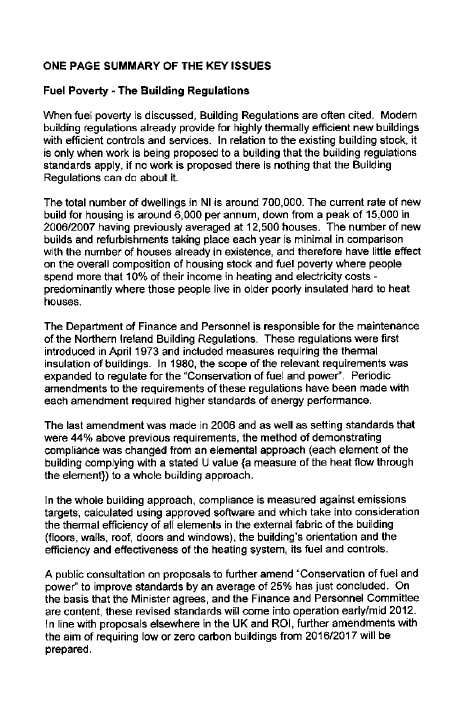
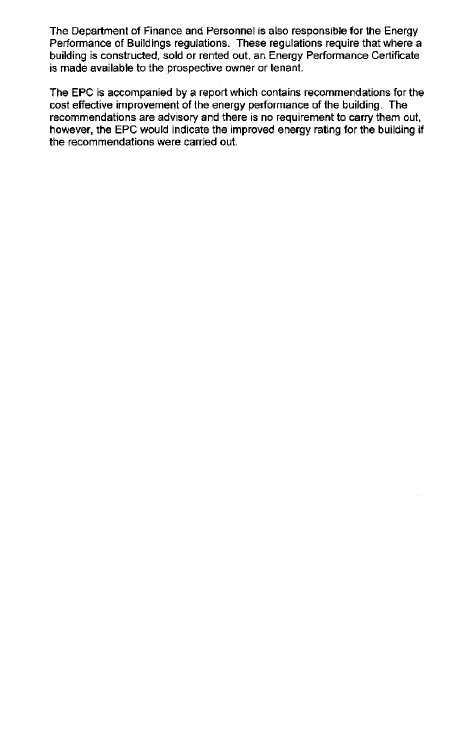
Department for Health Social Services and Public Safety
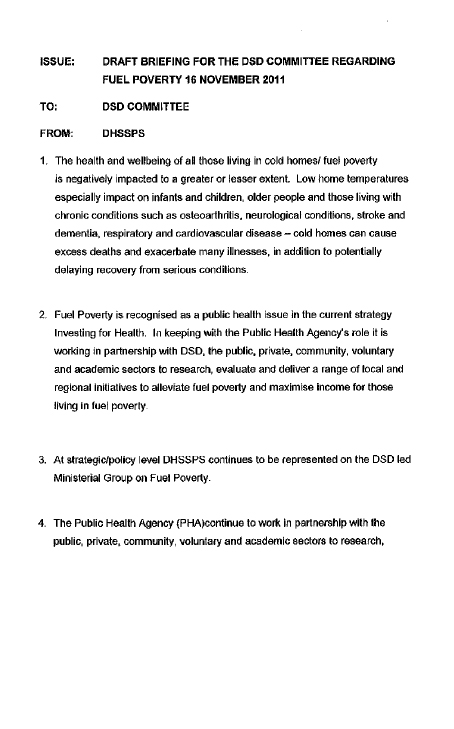
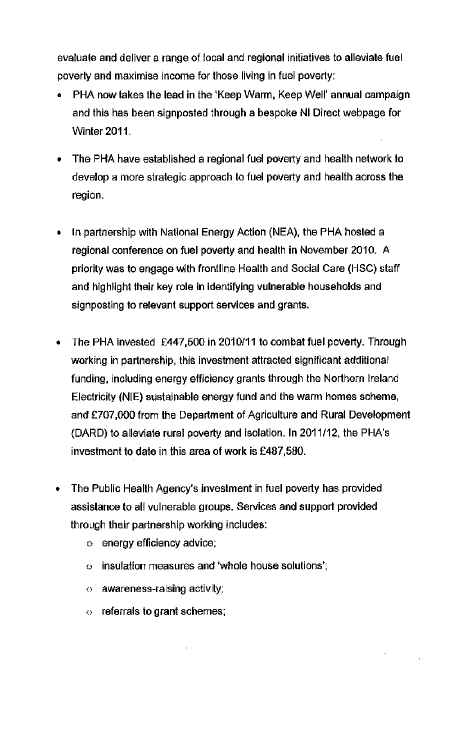
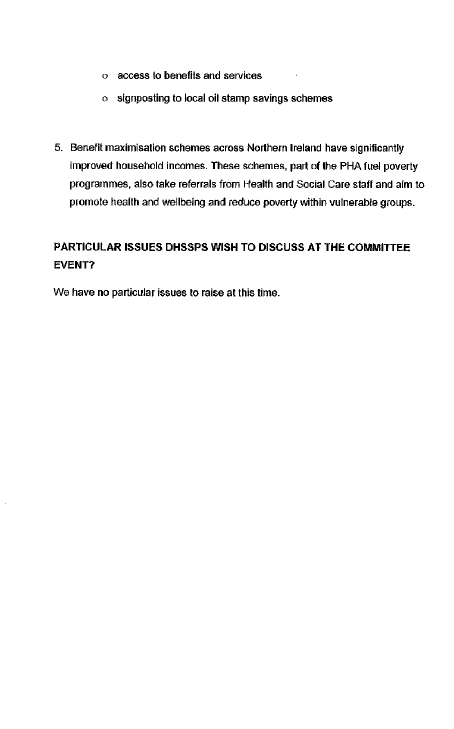
Department for Social Development
|
Dr Kevin Pelan |
2nd Floor 9 November 2011 |
Dear Kevin
Thank you for your letters dated 14 October and 7 November outlining the Social Development Committee's plans for a Fuel Poverty Event in Parliament Buildings on Wednesday 16 November at 6pm. The Committee has asked for the names of senior officials who will represent the Department at this event and for advance briefing to include a one-page summary of the key issues. Jim Wilkinson and I will attend on behalf of Department for Social Development. Minister Nelson McCausland will also be delighted to attend the event. I have set out below some briefing on the key points from the Department's new Fuel Poverty Strategy. I have also attached a one page summary of the key issues.
The new Fuel Poverty Strategy for Northern Ireland "Warmer Healthier Homes"
The Department's new Fuel Poverty Strategy "Warmer Healthier Homes" was launched in April 2011. The strategy sets out the Department's vision for the future…"a society in which people live in a warm, comfortable home and need not worry about the effect of the cold on their health".
The Strategy identified 4 key areas for action.
Key Area 1 - Targeting of Resources
This key area aims to "better target the resources available through the development and implementation of a robust mechanism for the measurement and analysis of fuel poverty with Northern Ireland".
The actions in this area centre on ensuring resources are targeted effectively at the most vulnerable households. The resources are committed through the various energy efficiency programmes funded by the Department such as Warm Homes Scheme, pilot Boiler Replacement Scheme and the Housing Executive's Heating Replacement Scheme.
Targeting of Resources
On 6 September, Professor Liddell from the University of Ulster published "Defining Fuel Poverty in Northern Ireland: A Preliminary Review". This review highlighted that within the 44% of households in fuel poverty, there is a core group of 13% of vulnerable households who are in extreme fuel poverty. This equates to approximately 75,000 households. The Department will use this research to evaluate how we deliver energy efficiency improvements to households in the future. We will examine existing energy efficiency schemes such as Warm Homes and the pilot Boiler Replacement to ensure that the measures available and the delivery methods are still appropriate and properly targeted.
Key Area 2 - Improving Energy Efficiency
This key area aims "to improve the energy efficiency of vulnerable households".
Warm Homes Scheme
Since its inception in 2001 the Warm Homes Scheme has provided insulation for almost 100,000 households and has installed new or upgraded heating systems in over 23,000 fuel poor households. During 2010, over 10,000 homes were assisted through the Warm Homes Scheme. The average energy efficiency gain was 25%. To date this year, almost 4,000 homes have been assisted with energy efficiency.
Pilot Boiler Replacement Scheme
The pilot Boiler Replacement Scheme was launched in June 2011. The rationale for the scheme was to offer assistance to vulnerable households who have not been eligible for any previous Government assistance. £2 million has been ring-fenced within the fuel poverty budget and we anticipate that approximately 1,330 households will benefit from the scheme. Initially, the target group was householders aged 60 and over, in receipt of Rates Relief (not Housing Benefit), with a boiler at least 15 years old. The scheme has now been extended to householders in receipt of Lone Pensioner Allowance. To date over 500 eligible applications have been received.
The Minister has asked officials to review the Warm Homes Scheme alongside the pilot Boiler Replacement Scheme to ensure our approach to energy efficiency improvement continues to target vulnerable householders.
Heating Replacement Programme
The Housing Executive continues to deliver its annual Heating Replacement Programme which ensures the standards of social housing in Northern Ireland continue to improve.
Smart Meters
The installation of smart meters in homes is expanding at an unprecedented rate in Europe. The European Union Energy Package includes a mandate to roll-out smart meters in all Member States with 80% coverage by 2020, and was endorsed by the European Parliament in Spring 2009. Used strategically, meters have the capacity to make energy efficiency both a desired option and an effortless transition for consumers throughout Europe. The Department is part funding a project in Northern Ireland which will pilot the use of smart meters.
Key Area 3 – Achieving Affordable Energy
This key area aims "to facilitate the achievement of affordable energy for households in Northern Ireland".
Energy Brokerage
The Department has introduced legislation to support housing providers to broker energy at a competitive rate for their tenants. The social housing stock in Northern Ireland comprises approximately 90,000 homes owned by the Northern Ireland Housing Executive and approximately 30,000 homes which are owned by a variety of Housing Associations. The rate of fuel poverty being experienced by tenants in Housing Executive households is now the highest of all tenures, with 57% of these households living in fuel poverty. The Northern Ireland Housing Executive is developing a scheme which will broker for fuel for Housing Executive and potentially Housing Association tenants. This energy brokerage scheme has the potential to make a significant impact on householder's ability to heat their homes and will, for the first time, provide some control on the price of household fuel. The Housing Executive plans to market test the proposal by the end of March 2012.
Benefit Uptake
Benefit Uptake has been one of the Social Security Agency's key priorities from 2005. Since then the Benefit Uptake Programme has generated £37 million in annual benefits and arrears. Of this, over £27 million has been for people aged 60 or over. The 2011/12 Benefit Uptake Programme consists of 4 strands; the first 3 mainly focus on those aged 60 or over.
It includes:
- targeted exercises - involving writing to 25,000 predominantly older people;
- a targeted Outreach strand - aimed at raising awareness at a community level of potential entitlement among older people;
- a province wide advertising campaign - aimed specifically at older people, it will be launched in the Autumn; and
- an innovation Fund - the community and voluntary sector has been invited to bid to an Innovation Fund of £250k to test new and innovative ways of reaching people to make them aware of benefits to which they could be entitled.
The 2011/12 Benefit Uptake Programme will complement the range of information and advice services already offered by the Social Security Agency. These include participation in local promotional activity, the production of specific publications, some in minority ethnic languages, the Department's website, the Benefits Adviser Service and general assistance with advice and information provided on ongoing basis through our network of local and centralised benefit offices.
The Social Security Agency 's Outreach Service, which is now an integral part of benefit uptake, provides home visits to vulnerable customers requiring assistance with all aspects of the benefit claims process.
Oil Stamp Savings Schemes
The Department believes that budgeting for fuel will be a critical tool in tackling fuel poverty in the future. DSD fully recognises the benefits of Oil Stamp Savings Schemes which encourage householders to budget more effectively for fuel. These schemes work most effectively when operated a local level and this is recognised a method of good practise. We continue to encourage Councils to operate schemes in their areas. The Department is also working with local companies Kingspan Environmentals and Carillion to develop a Pay as You Go option for oil. We plan to run a pilot exercise to test the feasibility of Pay as You go for oil early in 2012.
Key Area 4 – Building Strong Partnerships
This key area aims "to develop and consolidate effective partnership working across organisational and professional boundaries to provide more effective and integrated team working to eradicate fuel poverty".
DSD recognises the role of a wide range of stakeholders into tackling fuel poverty and firmly believe that it is only through partnership working that we can make real progress. Through the Fuel Poverty Advisory Group and the Inter Departmental Group on Fuel Poverty we have expertise from across Government and the wider energy sector. The Department now proposes to combine the two groups to form a new Fuel Poverty Forum which will bring more focus to fuel poverty.
Area Based Approach
DSD commissioned Professor Liddell to review the Kirklees model for delivering energy efficiency measures. The report concluded that it is a very worthwhile scheme providing the necessary resources are available. DSD is keen to investigate opportunities for an area-based approach and this will all form part of our review into future delivery of energy efficiency measures, as requested by Minister.
I trust the Committee finds this helpful and I look forward to the event on 16 November.

Eilish O'Neill
Fuel Poverty Event on 16 November Parliament Buildings
Department For Social Development Key Issues
- Fuel Poverty Definition
- Hills Review
- Warm Homes Scheme
- Boiler Replacement Scheme
- Future targeting
- Area based approach
- Green Deal/Green New Deal
- Energy Brokerage
- Pay as You Go for Oil
- Affordability of fuel
- Benefit Uptake
Office of the First Minister and deputy First Minister
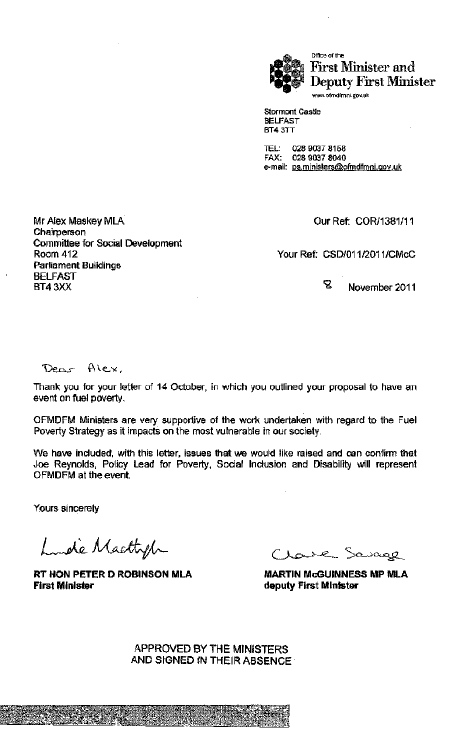
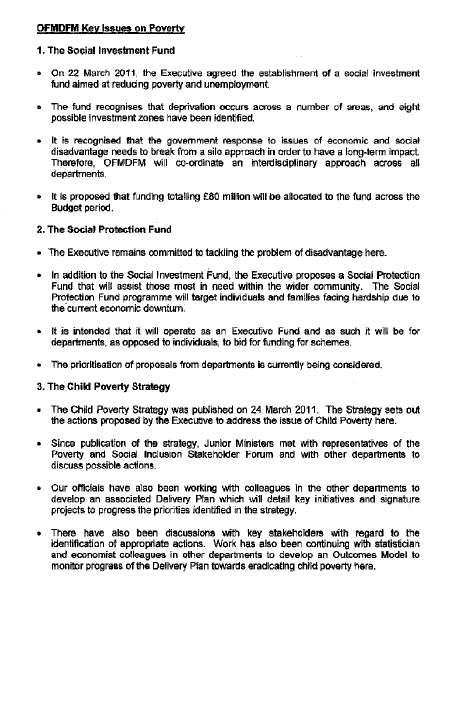
Appendix 3
Stakeholder Submissions
Access to Benefits
Potential Solutions to Fuel Poverty in Northern Ireland
A2B: Access to Benefits sees the following as potential ways of easing fuel poverty here:
- Maximising benefit uptake – more needs to be done to encourage people to have benefit checks and apply for benefits that they are currently not claiming. This is particularly important for older people who are missing out on, for example, at least £62million in Pension Credit here every year. Too often, they see it as accepting handouts or charity – the message we wish to promote is that claiming benefits is actually claiming back money you have paid into the system and is of benefit to the Northern Ireland economy. Receiving additional benefits can therefore help to pay for energy costs.
- Better data sharing and automatic payment – while some work has been carried out between Land and Property Services and the Social Security Agency on sharing data to improve uptake, this could be widened to help increase uptake to a wider range of benefits. Automatic payment of some benefits could also ensure that all eligible people receive payment. Again, this will lead to income maximisation which will help people to pay for fuel costs.
- Winter Fuel Payment – 97% of the Northern Ireland Pensioners' Parliament approved a motion calling for 'the UK Government to reverse its decision to cut the Winter Fuel Payment this year and to look at ways of linking future payments to energy prices'. A higher rate of the payment would again help to maximise income.
- Increasing financial capability – helping lower income groups to budget regularly over a period of time to mitigate the effects of price rise shocks, building on the oil stamps work already gaining traction among NI councils, would help greatly when householders are trying to plan for fuel expenditure.
- Better targeting and promotion of the Warm Homes Scheme – the Department should look at how it advertises the Warm Homes Scheme and look at ways of establishing eligibility for those who are not currently receiving help from the scheme. This also applies to other initiatives such as the Boiler Replacement Scheme and the insulation grants being offered by Power NI.
- Energy Brokering and Social Tariffs – some interesting work has already been carried out by the NI Assembly Research service, looking at examples from GB and further afield. This should be taken on board by the Department and recommendations should be drafted which would allow for some pilot work to be carried out on both of these initiatives.
Advice NI
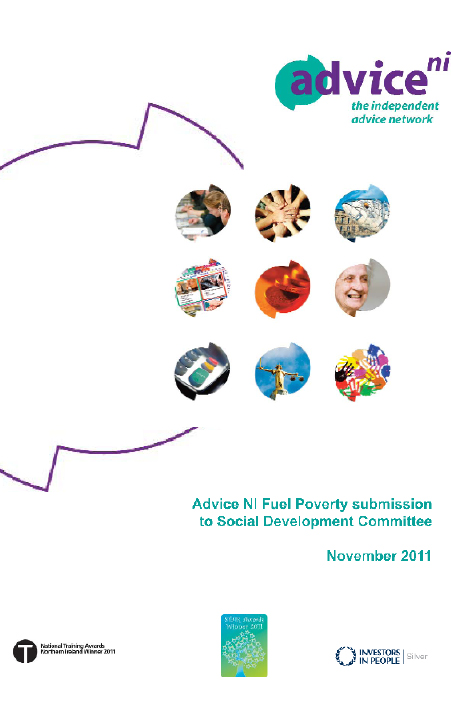
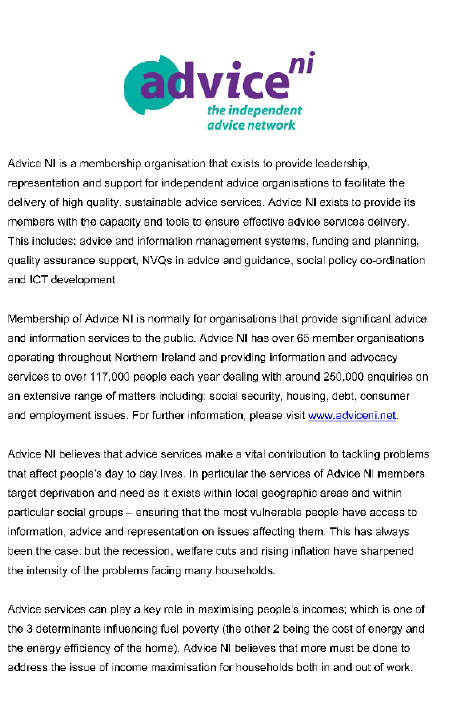
Age NI
Briefing to the Social Development Committee
16 November 2011
Social Tariffs
Despite higher levels of fuel poverty in Northern Ireland, older people here are not afforded the same level of protection as their counterparts in the UK. The Warm Homes Discount, funded by energy suppliers is paid to older people receiving Pension Guarantee Credit as a £120 annual deduction from their electricity bill. The scheme came into operation on the 1st of April. In light of escalating levels of fuel poverty in Northern Ireland, affordability policy must be progressed here as a matter of urgency.
The same progress has not been witnessed in Northern Ireland mainly due to a lack of political support. The key arguments given against the introduction of a tariff system here have been over how such a system would be funded. Age NI believes that conclusions are premature and unfounded. We want to see a full analysis of the various options of introducing social price support in Northern Ireland. No in depth assessment of options has taken place. In response to the arguments against a system of price support here, Age NI would argue that the smaller profit margin of energy companies in Northern Ireland is irrelevant. In GB, the costs of running a tariff system are ultimately passed on to other consumers anyway through a system of cross subsidy. A joint analysis of the situation should be led by the Department for Social Development and the Department for Enterprise Trade and Investment.
Greater protection for oil customers
The majority of older people are dependent on oil as their main source of heating. Those in the 60- 74 age bracket are the age group with the highest dependence on oil central heating at 75%, while 63% of those aged 75 and over are reliant on oil. Oil is a much more expensive form of heating than gas (£1,000 more per annum on average).[1] This high dependence, coupled with the fact that oil prices can be up to 70% more expensive than gas here, means that some form of regulation would be beneficial in Northern Ireland. Gas consumers enjoy a regulatory framework which ensures that they receive certain standards of customer service. Protection of the interests of gas consumers with regard to price and quality of service is a key objective of the Utility Regulator. Regulation would provide some reassurance to oil users that the price they are paying for their oil is reasonable. Furthermore, regulations would ensure that certain standards are met. For example, that boilers are fitted properly ensuring greater efficiency and thus saving the customer money.
Oil stamp savings schemes also operate in a number of council areas across the province and are popular with older people. The DSD should work with the DOE and remaining councils to roll out oil stamp savings. We are also aware that the DSD is exploring the potential to pilot a pay-as-you-go system for oil. We are encouraged by this development.
An area based approach to fuel poverty
Age NI is aware that the Department is exploring the potential of an area based approach to fuel poverty and that the Warm Homes Scheme will be reviewed. Whilst we are not opposed to an area based approach in principle we would have a number of concerns. Firstly, we would have concerns that local Councils will be expected to fund measures. This could result in a postcode lottery scenario. It could also result in a lack of clarity as to who has responsibility for fuel poverty measures. Secondly, we have concerns about targeting only those in severe fuel poverty does not take account of the fact that health impacts on an older person in 'moderate' fuel poverty could be s serious or more serious than a younger person in severe fuel poverty. There is a danger that this approach will neglect these older people.
[1] The Price of being Poor, The Consumer Council, June 2011
Age Sector Platform
DSD Committee – Fuel Poverty Paper, November 2011
Introduction
Age Sector Platform (ASP) welcomes the invitation to take part in the Committee for Social Development's Fuel Poverty event on the 16th November and commends the Committee for organising this meeting.
ASP is a charity which represents the interests of older people in Northern Ireland. It has a membership base of 30 older people's organisations and networks which represent approximately 200,000 older people. During 2011 ASP organised the first NI Pensioners Parliament (NIPP) which saw large numbers of older people consulted on what their top concerns were. 'Keeping Warm in Winter/Energy Prices' was the top concern with three quarters of older people (75.8%) listing this as a real worry.
At the two day Pensioners Parliament in June older people from across NI discussed the issue in great detail and voted on what they believe could help address this serious issue. Some of the recommendations require action by the UK Government at Westminster while others are within the remit of the NI Assembly. The main recommendations on what could be done to tackle fuel poverty are included in the following pages.
NIPP Recommendations on tackling Fuel Poverty
The Northern Ireland Pensioners Parliament has called on the NI Assembly to make tackling pensioner poverty a key priority in their new Programme for Government. If older people are to be helped out of fuel poverty their income must be increased and they need to get greater protection from rising energy prices. The following pages provide some recommendations on how these two issues can be tackled.
1 Raising Income Levels
(i) Basic State Pension
One of the major factors in fuel poverty is inadequate levels of income and this has to be tackled if older people are to be able to heat their homes to a safe level. The basic state pension needs to be significantly increased from its current rate of £102.15, and even with pension credit the £137.35 available to those who claim falls well below the governments own estimated poverty line of £178 a week before housing costs.
(ii) Automatic Payment of Pension Credit
Despite a number of initiatives to promote benefit uptake amongst older people it is estimated that the average amount of weekly unclaimed Pension Credit in Northern Ireland is estimated to lie in the range £1.2m to £2.3m per week. This is money sitting in the treasury instead of in the pockets of many of the older people who need financial help the most.
The automatic payment of Pension Credit would address many of the barriers pensioners face to getting what they are entitled to and we believe that the Minister for Social Development should make a case to the DWP for a pension credit pilot in Northern Ireland. There is also a strong economic argument for automatic payments which should not be underestimated. The additional income could afford older people a better quality of life, increase local spending and boost the Northern Ireland economy.
(iii) RPI v CPI
The decision by the UK Government to change how pensions are up-rated from the Retail Price Index (RPI) to the Consumer Price Index (CPI) should be reversed. Since 2000, RPI has been higher than CPI by over 0.8 per cent a year on average and this will have a significant negative impact in the medium to longer term on pensioner incomes.
The NIPP also recognised that many pensioners just above the benefits line are also facing major difficulties in paying for the necessities of heating and eating and believes more needs to be done to help this group, many of whom are worse off financially than those receiving benefits.
2 Tackling High Energy Prices
(i) Energy Discount Schemes
Age Sector Platform (ASP) believes that older people in NI are being disadvantaged by not being offered energy discount schemes which are in place throughout the rest of the UK. More than half a million pensioner households in Great Britain will get £120 off their bills this winter through the Warm Home Discount Scheme. However, pensioners in Northern Ireland can not benefit from this scheme as it is not provided by NI energy companies. ASP believes that the DETI Minister should bring forward plans to get energy companies to introduce similar schemes in Northern Ireland.
(ii) Winter Fuel Payment
This year, the UK Government has decided to cut the winter fuel payment for people aged between 60 and 80 by £50 and for people aged over 80 by £100. Age Sector Platform believes that this is a shocking decision which will cost lives and that the winter fuel payment should be increased to reflect high energy prices, not reduced.
(iii) Regulation of the Oil Industry
The NIPP has called for the oil industry in Northern Ireland to be regulated to help ensure that oil customers get value for money. Northern Ireland has the largest percentage of households using heating oil in Western Europe – with 68 per cent homes (82 per cent in rural areas) using heating oil as their primary heating source.
(iv) Oil Stamp Schemes
ASP is aware that some local council's have developed oil stamp schemes to assist pensioners to save for the purchase of home heating oil. The Pensioners Parliament has called for a NI-wide scheme to be developed so pensioners can avail of such a scheme no matter where they live.
(v) Social Protection Fund
The NI Executive can help those older people at risk from the cut this winter by providing an emergency payment through the Social Protection Fund. We believe that such a payment would significantly help older people this winter and would be an excellent use of these vital funds. This is not a long term solution to fuel poverty but something that could help older people cope with their cut in their fuel payment this year. Age Sector Platform's petition against the cut has attracted almost 16,000 signatures to date which highlights the level of concern amongst older people about the impact this cut will have on trying to keep warm this winter.
Conclusion
Age Sector Platform welcomes the opportunity to comment on this serious matter which is the number one concern of older people in Northern Ireland at this time. As outlined in our response, the NI Assembly does have the opportunity to help many vulnerable older people during the coming winter months through the social protection fund but also needs to start developing new schemes that can help tackle this serious issue in the medium to long term. We look forward to participating in the event on the 16th November and on working with the DSD Committee and others on how we can make progress on fuel poverty. If you need any further information on anything mentioned in this paper please do not hesitate to get in touch.
Summary by Bryson Charitable Group
Monday 7th November 2011
Fuel Poverty in Northern Ireland
Bryson Charitable Group welcomes the opportunity to contribute to the Fuel Poverty Event at Stormont on the 16th November 2011 and to meet with Committee Chairs and Department officials in relation to increasing problem of fuel poverty in NI.
Bryson is the sixth largest social enterprise within the United Kingdom with over 660 staff and a turnover in excess of £30m. Bryson has been involved in fuel poverty initiatives since the late 1980's and its business unit, Bryson Energy is currently one of the two Scheme Managers for Warm Homes, the Government's primary tool to tackle fuel poverty within NI.
There is no single solution to fuel poverty which occurs in 44% of NI households. While this figure is higher than other regions of the UK the solutions here will need to reflect that some 70% of households rely on oil as their primary source of heating. No single measure will solve fuel poverty rather a range of interventions will be required.
Potential Solutions
Targeting – Recent research by Professor Christine Liddell on behalf of DSD has identified that 14% of the 44% of households in NI are in severe fuel poverty, some 77,000 households. Bryson would be keen that funding is provided to identify these households and a package of appropriate solutions be implemented to ensure that we address the households that are clearly identified as most in need.
Payment Methods – Bryson would advocate a payment system for purchase of oil which does not have a premium attached to buying in low quantities. This would help negate the need for garage forecourt 5 litre drums at up to three times the normal cost of oil. A device similar to the prepayment cards for electricity and gas this could be in the form of a Pay As You Go system (PAYG) as currently being trialled however Bryson is concerned that costs such as administration of scheme and premiums for the PAYG system must not result in an inflated fuel price for the householder.
Regulation – The recent OFT Report into the oil distribution business in NI stated that it was an oddity that the large dependence on oil as a fuel in Northern Ireland had not resulted in regulation. Bryson believes that regulation both on price and installation standards, as in the case of electricity and gas should be examined for oil alongside an Energy Company Obligation or Levy for Fuel Poor initiatives. However, consideration would need to be given to the cost of regulation falling on the customer.
Warm Homes – As one of two scheme Managers of the Warm Homes Scheme Bryson has been concerned that the funding for Warm Homes has been depleted rather increased against the background of growing fuel poverty. In addition the recent introduction of a Boiler Allowance Scheme administered by the NIHE added another unnecessary confusing and expensive infrastructure and targeted at those who were not in greatest need. The restrictions of Warm Homes including financial limits on insulation levels and the exclusion of broken and old, inefficient boilers should be reviewed and the funding for the Scheme returned to at least the pre 2009 levels of £20m as opposed to the current £13m.
Energy Brokering – Recent work by Bryson the Consumer Council and NIHE show that there is significant savings to be made by households through energy brokering. Bryson believes that Government Estate could and should lead the way on this and the purchasing power of organisations such as NIHE could also result in significant savings for households.
Green New Deal – While the recent proposals to Government for Green New Deal were not exclusively tailored to address Fuel Poverty in Northern Ireland it would not be possible to operate a scheme without the inclusion of fuel poor households due to their significant numbers. Current interventions such as Energy Advice, Warm Homes, NISEP funded schemes and Utility Schemes would certainly be more effective if packaged together and operated on an area-based approach. The opportunity to carry out a whole house solution that Green New Deal offers is attractive to Bryson. Bryson believes that the working fuel poor and those on the edge of fuel poverty alongside those more affluent households will need a financial incentive to avail of the Green New deal offer. Bryson strongly advocates that Government provides this incentive as outlined in the green new Deal submission.
Advice - As the largest provider of independent energy advice to householders Bryson would advocate that sufficient resources be secured to continue an energy advice provision after the end of current DECC funding in March 2012. The current DECC funding will cease due to the introduction of Green Deal in GB however this will not apply in NI. Figures obtained from Professor Christine Liddell, University of Ulster show that energy bills can be reduced by 6% through behavioural advice while face to face advice and assistance can reduce bills by 12%. The Northern Ireland statistics for fuel poverty highlight, in contrast to the GB figures, that significant numbers of households are not, under the current definition, fuel poor but are close to being so. Intervention is always preferable to cure and while NI tackles large numbers of households already in fuel poverty it should also ensure that households are given the assistance needed to stay out of fuel poverty. Much of this intervention can be done through energy advice therefore Bryson believe that locally tailored and delivered advice should be recognised as an important element in both preventing and combating fuel poverty. Recent studies have highlighted that along with behavioural advice the presence of visual energy use technology can reduce energy usage and Bryson support the introduction of Smart Meters; however it is concerned that the increasing costs of proposed meter capabilities are more related to Utility requirements than householder needs. ENDS
Chartered Institute of Environmental Health
11th November 2011
Briefing for Social Development Committee
RE: Fuel poverty event, 16th November 2011
Introduction
The Chartered Institute of Environmental Health (CIEH) has a key interest in this issue, which is why we are supporting the Fuel Poverty Coalition in Northern Ireland and indeed are part of the steering committee. We further believe that there are clear opportunities for our membership located within the local authority sector in NI, to make a contribution towards alleviating the issue given the roles that they currently have in public health and housing. Indeed many environmental health departments across NI have already sought to provide practical support and interventions designed to address this significant public health issue.
Policy Context
Levels of fuel poverty in NI are well documented and are clearly unacceptable. The committee will be aware that NI has the worst levels of fuel poverty within the UK. There are also clear and inextricable linkages between fuel poverty and food poverty – certainly in terms of the fiscal issues.
It is not only fuel prices that continue to rise. Food prices too, in no small way because of the critical dependency of the food industry on energy and fossil fuel derived energy in particular, continue to escalate. In practical terms, as has been highlighted by several commentators recently, the choice between either heating or eating would now appear to be a very real one for many people within our society. Although it is currently not as easy to quantify the percentage of the NI population in food poverty because of the complexities of the issue, in our view it is reasonable to suggest that most if not all of households struggling to pay energy bills are also highly likely to be finding difficulties in affording the shopping baskets they would have previously selected. This in turn, as previous research has shown, can have significant implications for dietary health.
It therefore follows that, policies and interventions that alleviate fuel poverty are likely to have appositive impact on other areas of poverty and deprivation if they reduce expenditure on energy and fuel costs. It also follows that this, in turn, will make a potentially significant contribution towards sustainability, in particular by reducing greenhouse gas emissions (GHGE) through better energy efficiency. Domestic properties are a significant part of NI's GHGE portfolio due largely to the fuel mix involved, particularly oil, as well as inefficient houses in terms of energy conservation.
Solutions
1 The green new deal should be unequivocally supported and implemented. The relatively modest investments required will
- Be recouped fairly quickly
- Have the potential to provide much needed employment, particularly in the construction sector.
- Will reduce household expenditure on energy and fuel and
- Will make a significant contribution towards reducing NI emissions.
2 Much better efforts should be made to link publicly funded services that exist already to provide practical support and assistance to those suffering fuel poverty with those households that need it.
3 The executive should seriously consider interventions that would immediately assist in reducing the cost of energy to those most in need. Practical actions are needed to follow through on the executive's unanimous agreement that this issue is intolerable. The bulk purchase of heating oil is one example of ways in which the executive could intervene.
ABOUT THE CIEH
The CIEH is a registered charity and a professional and educational body. We are dedicated to promoting environmental health and encouraging the highest possible standards in the work and training of environmental health practitioners.
The CIEH has a history and heritage that gives us an authority, a wealth of knowledge and a keen commitment when it comes to environmental and public health issues. We have strength in depth thanks to the 10,000 or so members and the many partners we work with.
The CIEH has long argued that reducing health inequalities calls for prevention as well as cure. We believe our society benefits when there is an enhanced role for environmental health practitioners. For more information go to our website: www.cieh.org or www.cieh-nireland.org
Should you require further information contact:
G. McFarlane
Director CIEH NI
Philip House
123 York Street
Belfast
BT15 1AB
Tel: 02890243884
Email: g.mcfarlane@cieh.org
Chartered Institute of Housing
Committee for Social Development: Fuel Poverty Event
The Chartered Institute of Housing supports the Committee's recognition that fuel poverty must be a priority for government. We are a member of the Fuel Poverty Coalition and responded to the Department for Social Development's consultation on Warmer Healthier Homes. Our response to the new fuel poverty strategy concurred with the decision to focus improving energy efficiency as a key area that government can directly and effectively influence. This means that housing has a fundamental role to play in meeting government's objectives in tackling fuel poverty.
CIH welcomes the opportunity to take part in this event and hope to help inform the debate and discussion around potential solutions by looking at what work is currently underway elsewhere that could be relevant for Northern Ireland. This includes:
- The interim report on Fuel Poverty by Professor John Hills aimed at improving the targeting of resources to tackle fuel poverty and examining why significant investment in interventions have failed to meet targets to eradicate fuel poverty
- Scotland's Universal Home Insulation Scheme – the success of the scheme to date and levels of investment
- Wales's strategic energy performance investment programme – Arbed – and its success in helping to eradicate fuel poverty and the additional funding sources it has been able to access to support government investment in the scheme
- Nest – the Welsh Government's new fuel poverty scheme delivered in partnership with energy providers
In addition to the strategic approach to addressing fuel poverty, CIH believe that that there are many practical ways in which housing providers, particularly in the social rented sector, can help mitigate the impacts of fuel poverty on households. This might mean supporting tenants who wish to downsize to smaller, easier to heat properties in doing so; helping to educate tenants about how to heat their homes more effectively (work that could and should also be extended to the private sector); or facilitating community energy projects.
The Commission on the Future for Housing called for a Retrofit Scheme for Northern Ireland that would directly address energy efficiency, thus reducing fuel poverty levels. Such a scheme would consolidate approaches to the energy efficiency aspect of fuel poverty across all tenures and could maximise public investment as well as having the capacity to leverage additional funding from European funds or the private sector. CIH still believes that this approach offers the best opportunity to effectively tackle fuel poverty in the short to medium term.
Citizen Advice Report
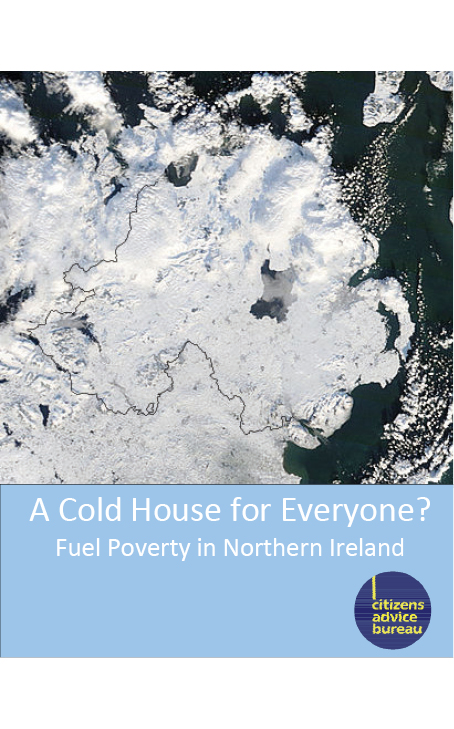
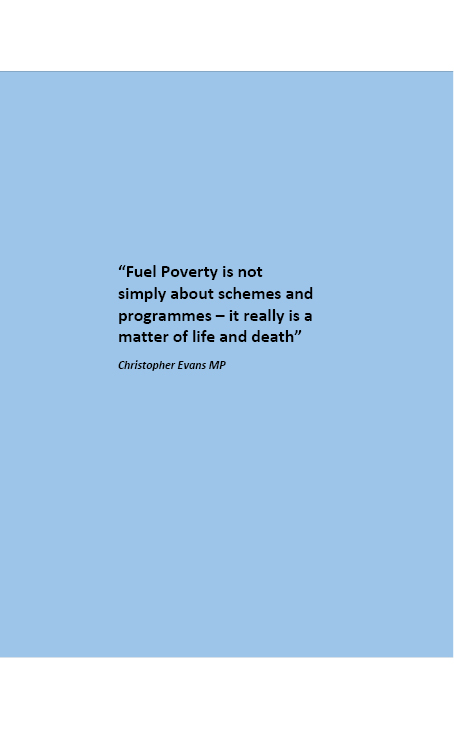
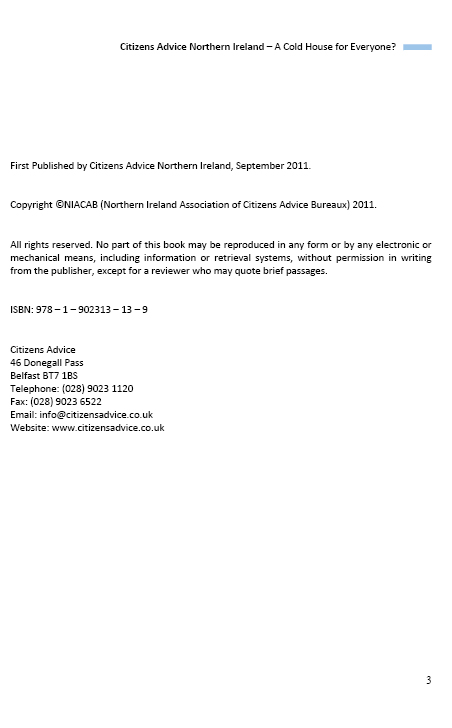
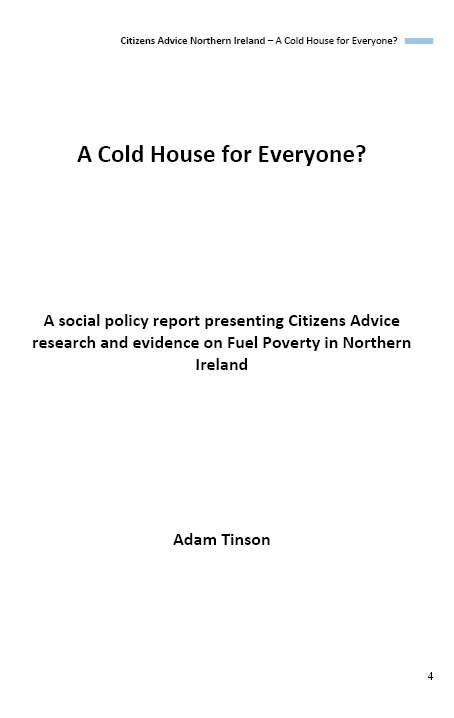
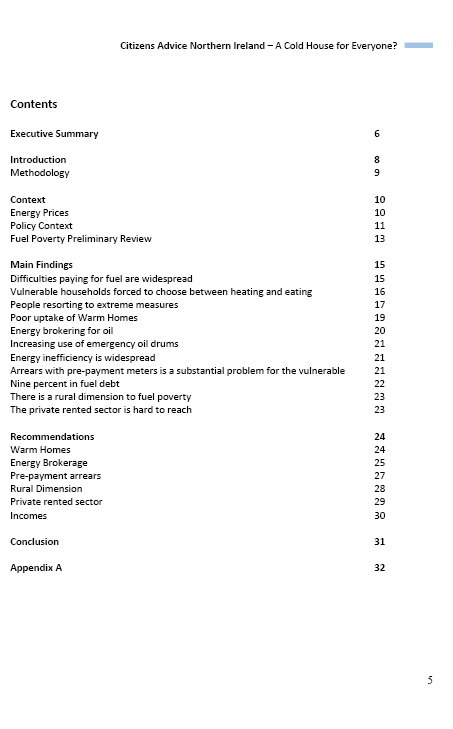
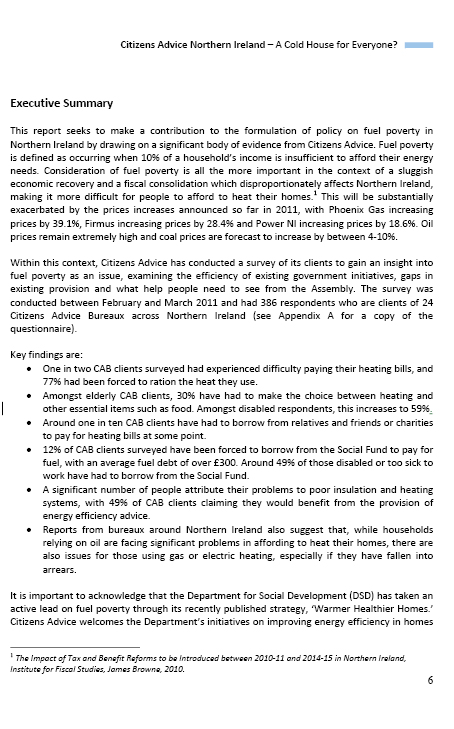
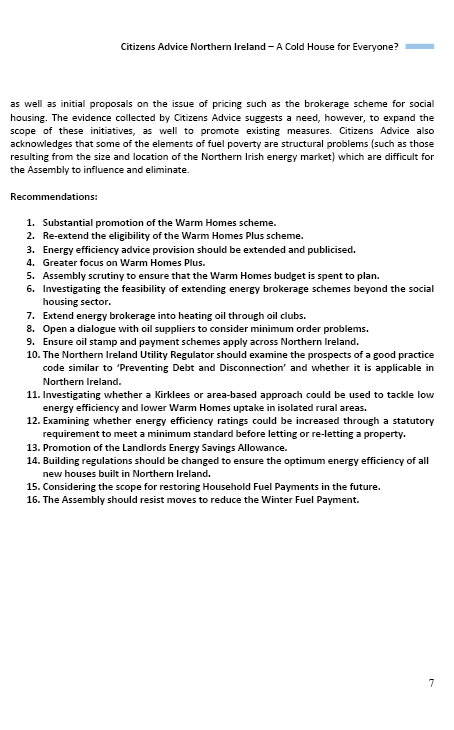
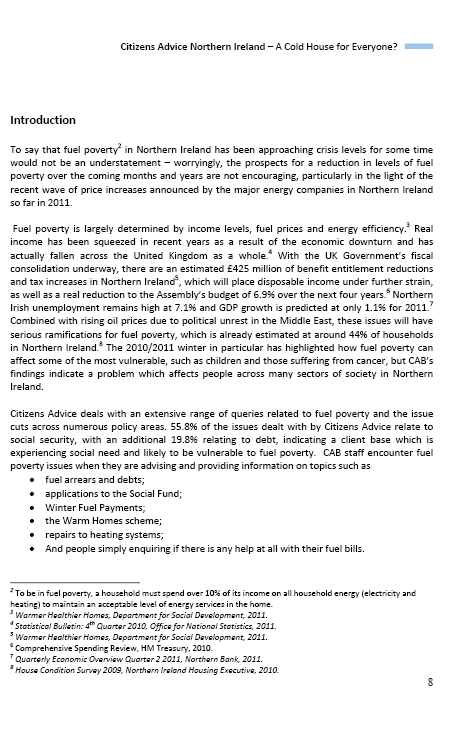
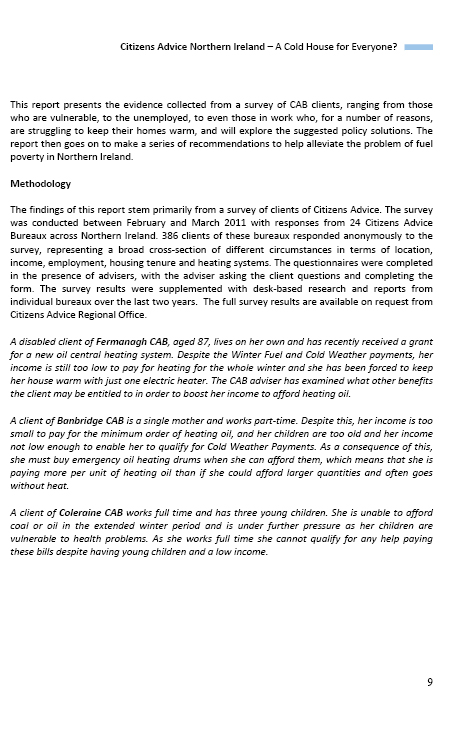
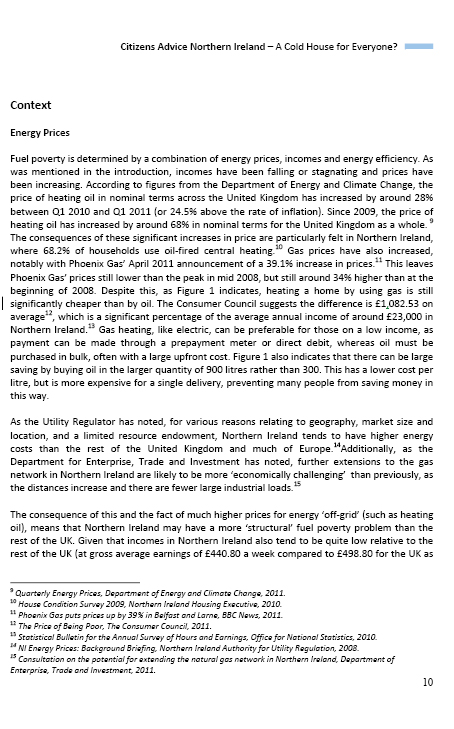
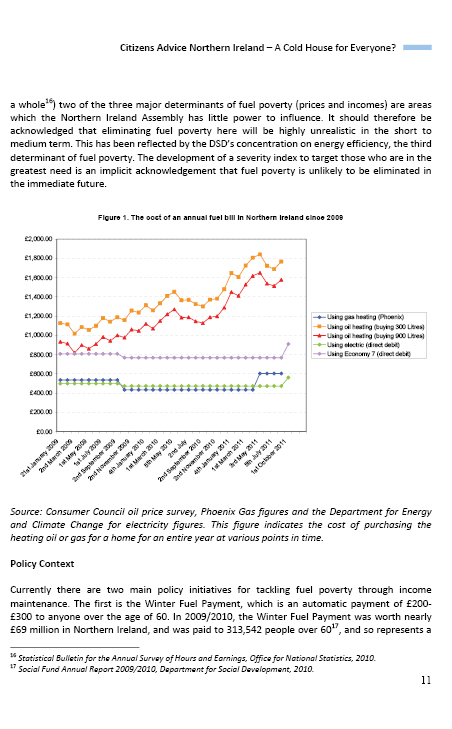
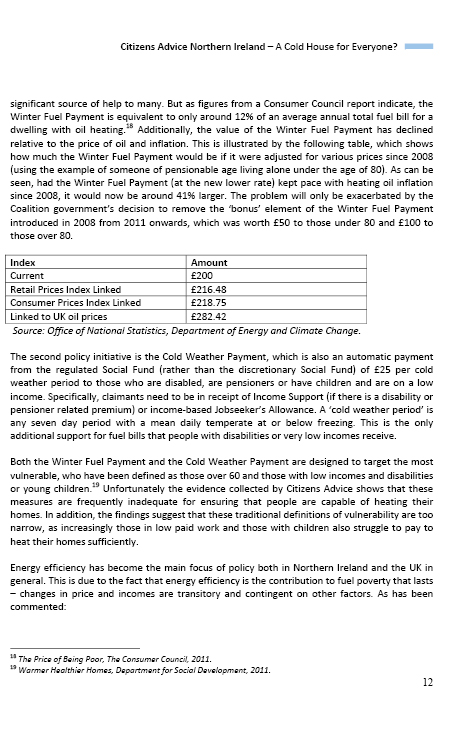
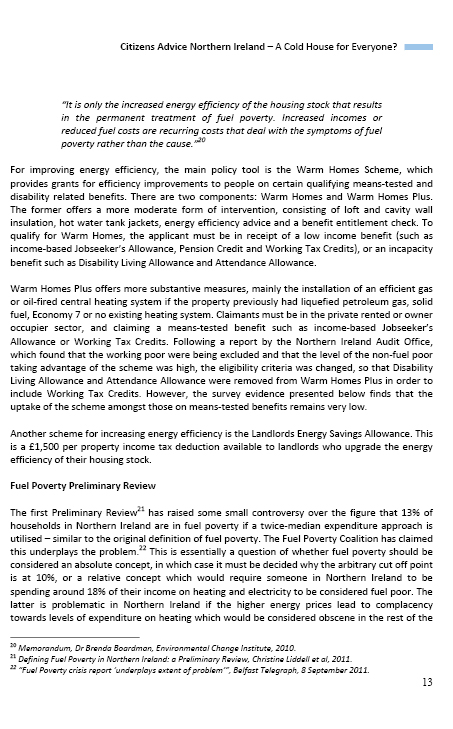
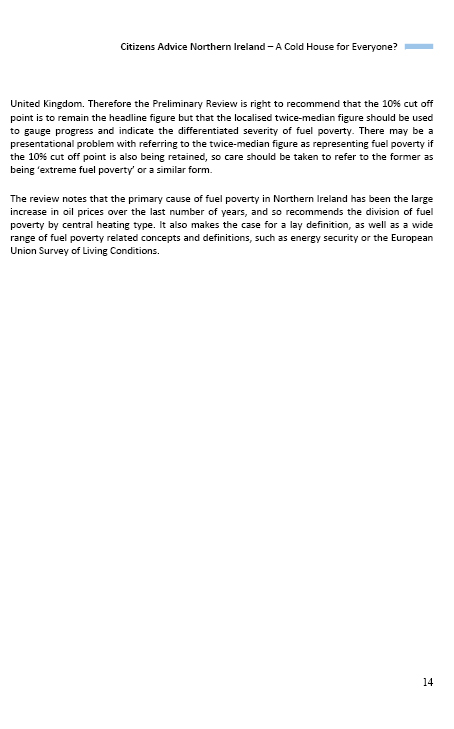
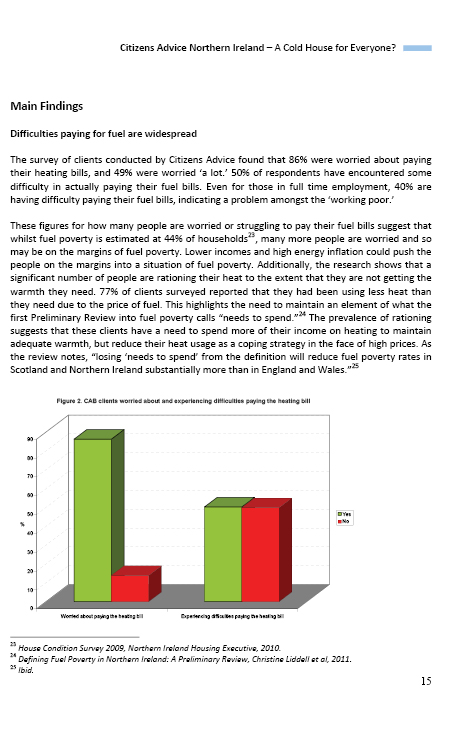
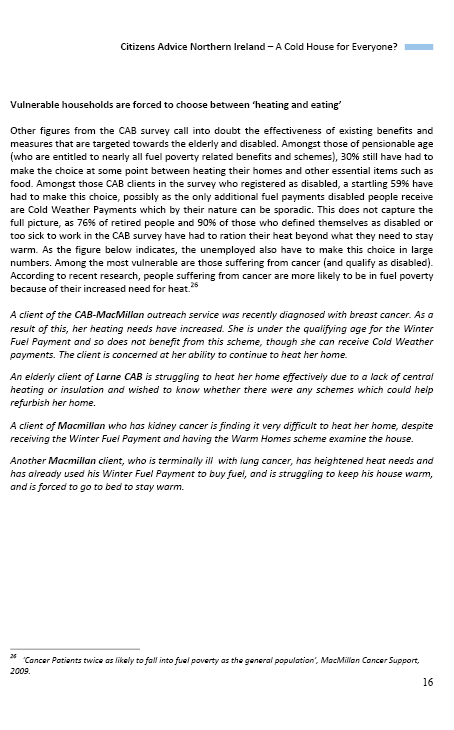
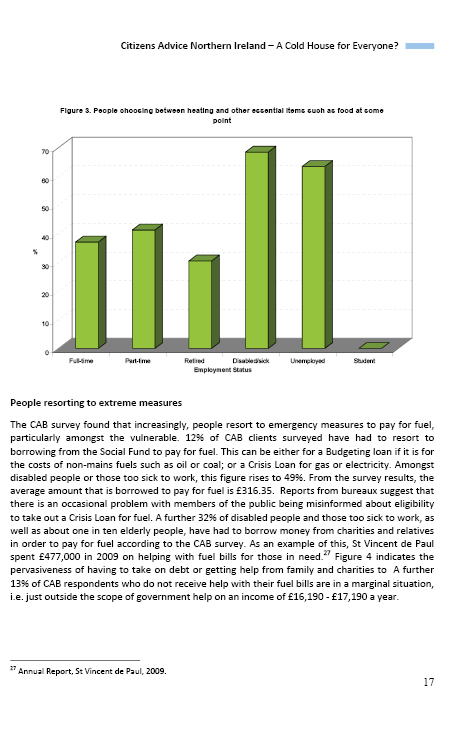

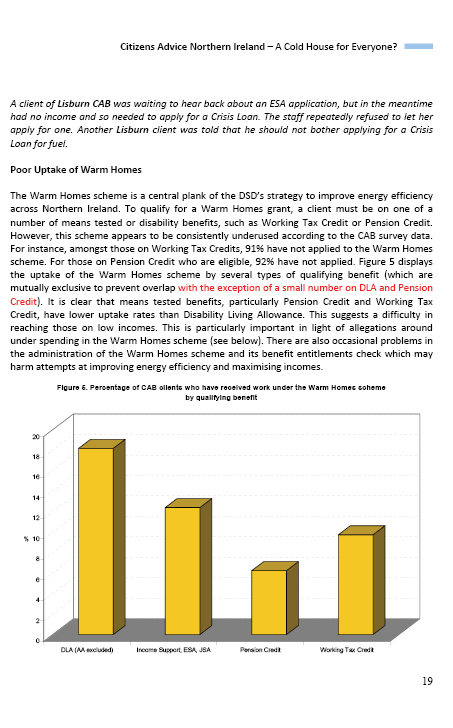

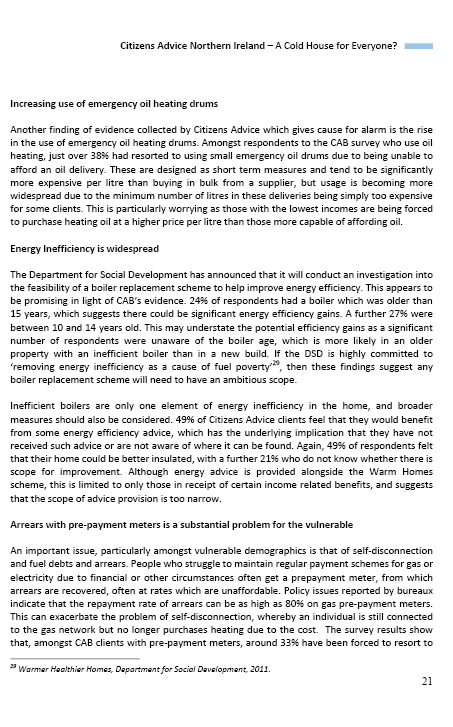
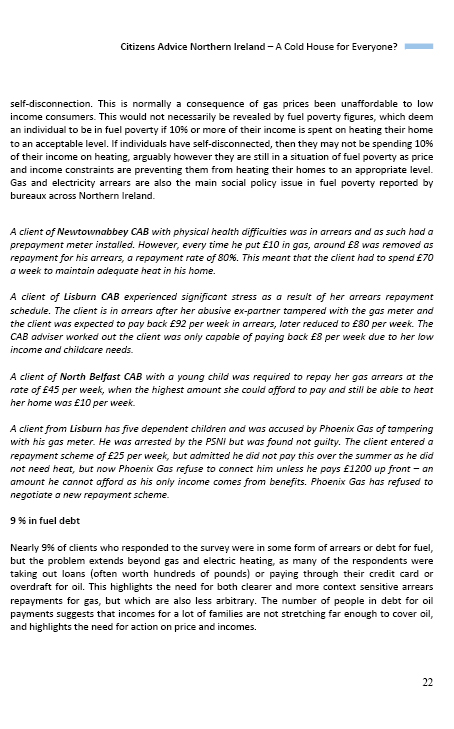
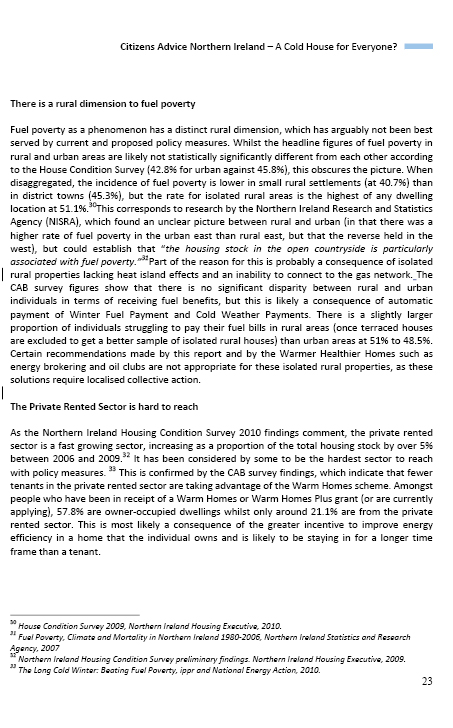
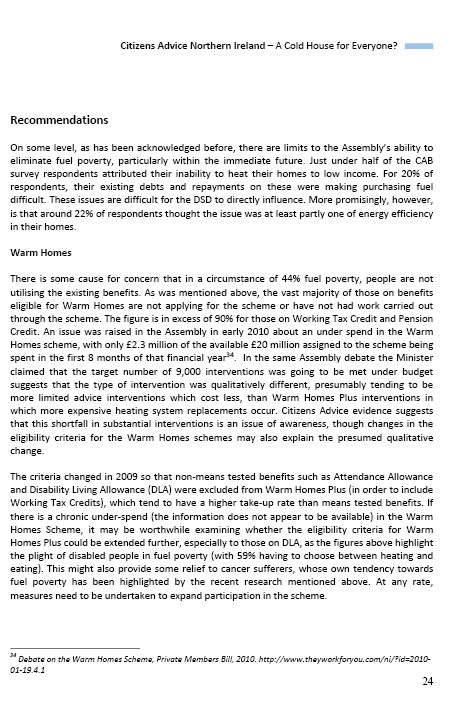
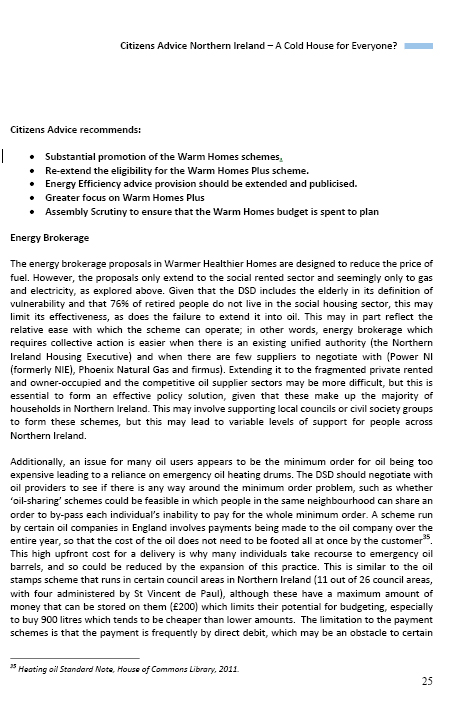
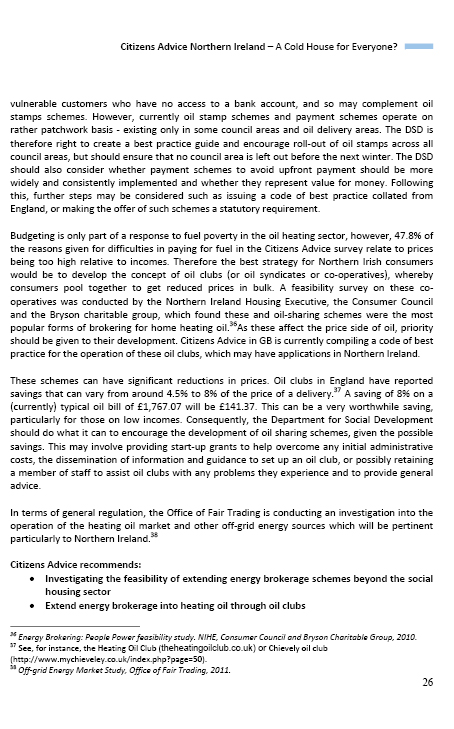
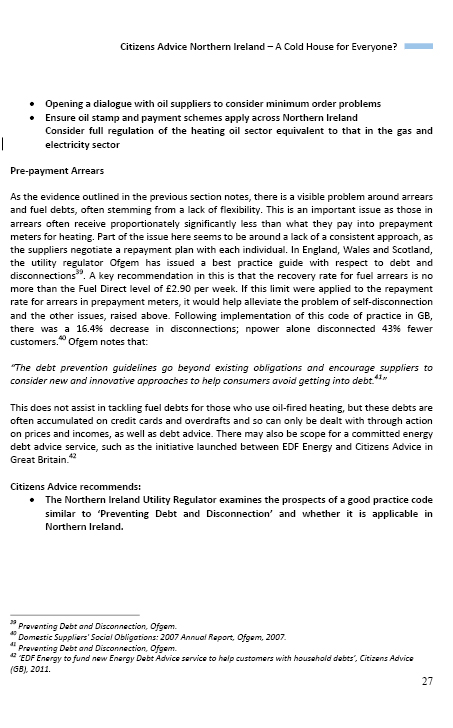
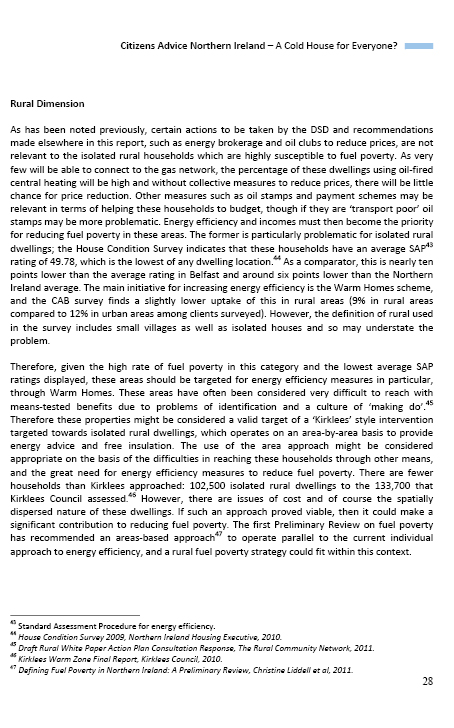
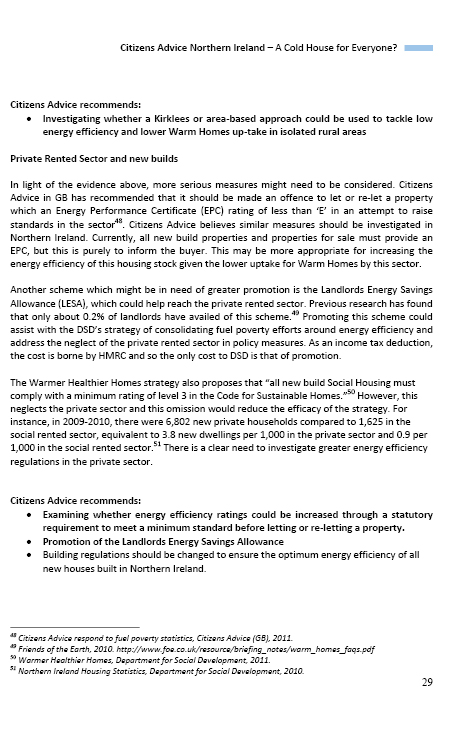
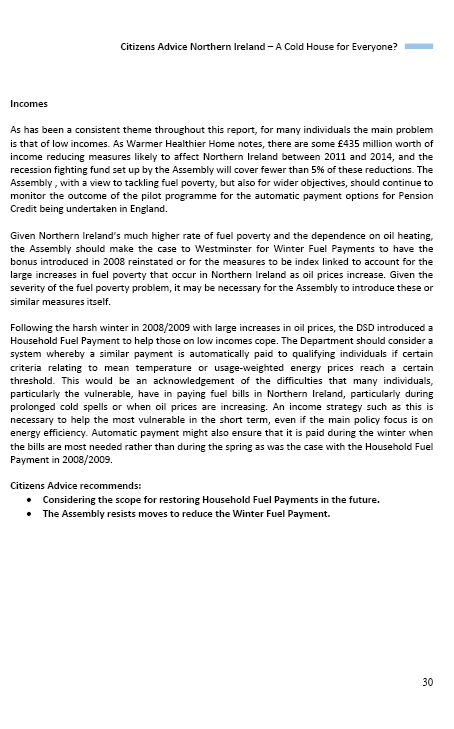
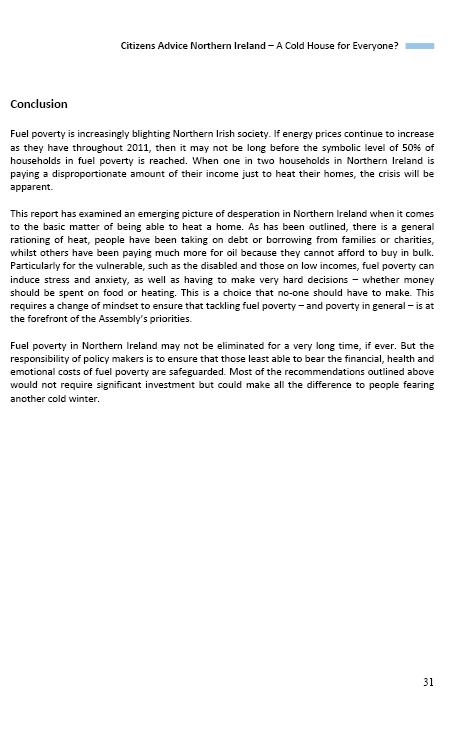
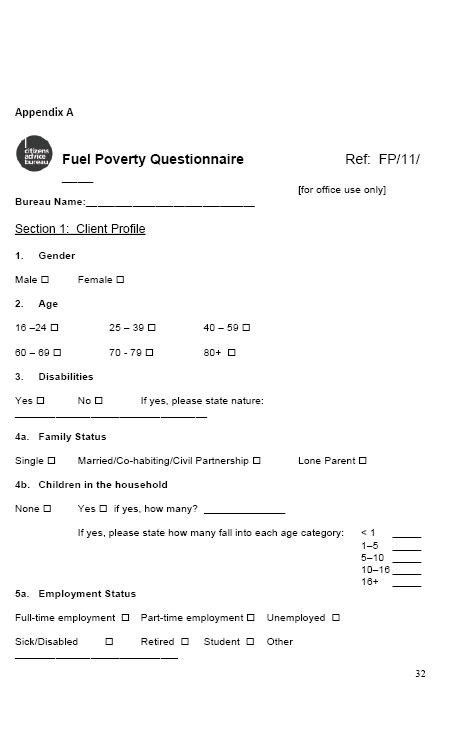
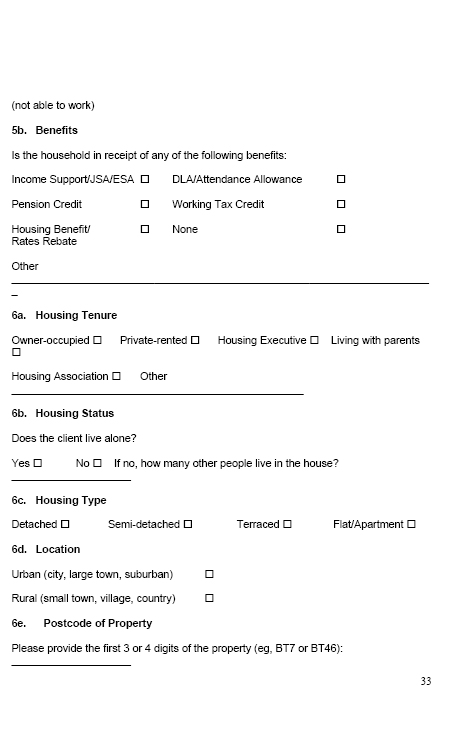
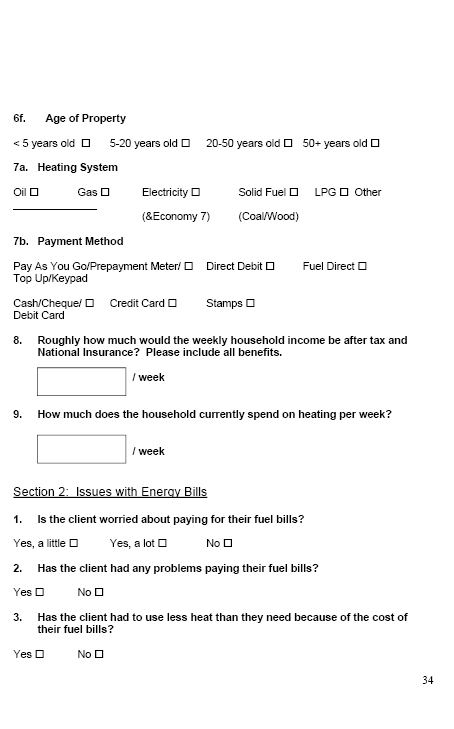
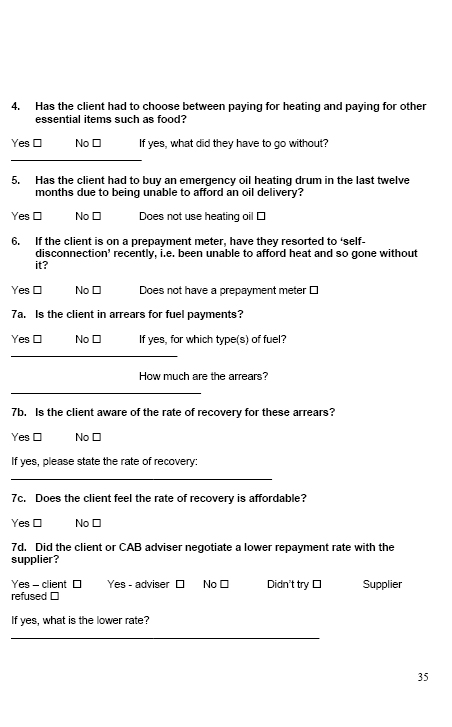
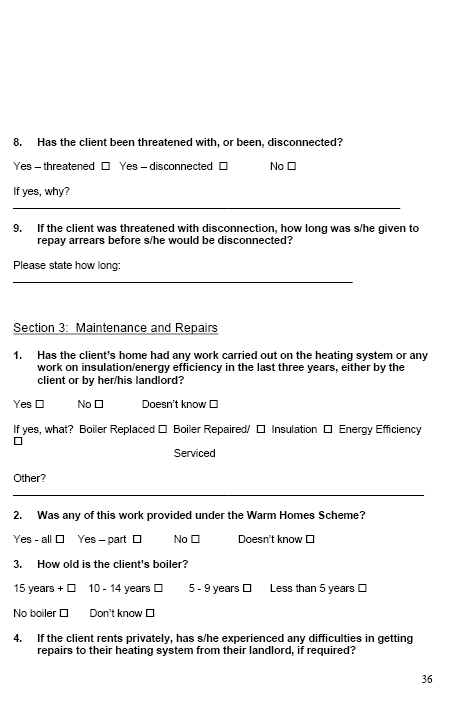
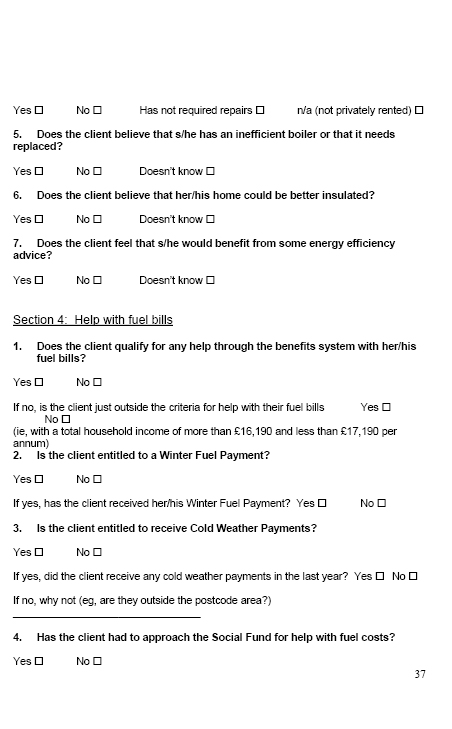
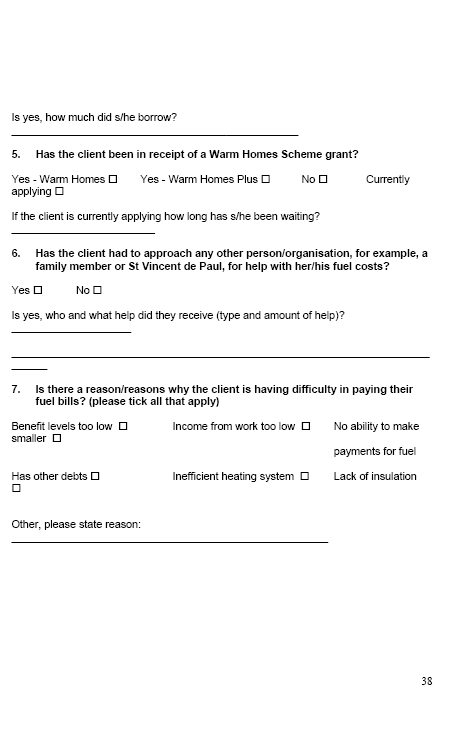
Citizen Advice
Recommendations: A Cold House for Everyone? October 2011
1. Substantial promotion of the Warm Homes scheme.
2. Re-extend the eligibility of the Warm Homes Plus scheme.
3. Energy efficiency advice provision should be extended and publicised.
4. Greater focus on Warm Homes Plus.
5. Assembly scrutiny to ensure that the Warm Homes budget is spent to plan.
6. Investigating the feasibility of extending energy brokerage schemes beyond the social housing sector.
7. Extend energy brokerage into heating oil through oil clubs.
8. Open a dialogue with oil suppliers to consider minimum order problems.
9. Ensure oil stamp and payment schemes apply across Northern Ireland.
10. The Northern Ireland Utility Regulator should examine the prospects of a good practice code similar to 'Preventing Debt and Disconnection' and whether it is applicable in Northern Ireland.
11. Investigating whether a Kirklees or area-based approach could be used to tackle low energy efficiency and lower Warm Homes uptake in isolated rural areas.
12. Examining whether energy efficiency ratings could be increased through a statutory requirement to meet a minimum standard before letting or re-letting a property.
13. Promotion of the Landlords Energy Savings Allowance.
14. Building regulations should be changed to ensure the optimum energy efficiency of all new houses built in Northern Ireland.
15. Considering the scope for restoring Household Fuel Payments in the future.
16. The Assembly should resist moves to reduce the Winter Fuel Payment.
17. We believe that part of the solution to this issue lies outside Government, and that the Assembly should ask District Councils to co-ordinate local initiatives in the event of another arctic winter. These would include churches, voluntary organisations, sporting organisations and individuals. Initiatives could include, centres for people to keep warm, and receive hot food, donations of cash, food, clothing, systematic checking on neighbours, fuel clubs to organise a bulk purchase of coal or oil in a certain geographic area to reduce the cost of deliveries.
Consumer Council Briefing Paper
Social Development Committee Fuel Poverty Event
November 2011
Introduction
Nearly one in two households are in fuel poverty in Northern Ireland. This is significantly higher than in Great Britain and the Republic of Ireland, where the fuel poverte levels are 13 per cent and 19 per cent respectively.
The higher rate in Northern Ireland is driven by several unique factors:
- Around 70 per cent of homes use home heating oil to heat their homes. Heating oil has the most volatile prices of any heating fuel. Its price has risen 69 per cent in the last two years.
- The overall cost of energy in Northern Ireland is double that of a household in Great Britain. The average annual heating oil and electricity bill here is £2,262. This compares with the highest annual dual[1] fuel bill in Great Britain of £1,100.
- In GB, ROI and the rest of the EU, lower energy prices are provided to households struggling to afford their energy costs. This can be done via energy brokering or social tariffs.
- In 2008, Douglas McIldoon (the previous Utility Regulator) undertook a review of the electricity market in Northern Ireland. He concluded that energy prices were higher than they needed to be because "policy is confused and contradictory".
- The recent interim review[2] of fuel poverty by John Hills highlights that living in a cold home has a series of effects on illness and mental health. Hill suggests more people die per year as a result of living in a cold home than are killed in traffic accidents. In Northern Ireland there is currently an average of 910 excess winter deaths per year, which compares to a level of 589 excess winter deaths here in 2001/01.
The Consumer Council, along with the Northern Ireland Fuel Poverty Coalition has called on the Northern Ireland Executive to:
- Develop a detailed and fully costed action-plan setting out how and when fuel poverty will be eradicated in Northern Ireland; and
- Provide support to all fuel poor households to stay warm until fuel poverty can be eradicated.
As part of this, the NI Executive can undertake immediate the following practical actions:
1. Establish a Ministerial Task Force with a duty to eradicate Fuel Poverty in Northern Ireland: the task force must focus on delivery and bring coherence to achieving clear targets to tackle fuel poverty. The Programme for Government should commit all Government Ministers to incorporate practical action plans on Fuel Poverty within their Department's overall strategic plans.
2. Area Based Insulation Programme: the Warm Home Scheme should adopt an area based approach similar to that of the Kirklees Warm Zone, which helped three times as many homes as Warm Homes with the same budget.
3. Energy Brokering: use the purchasing power of the Government's estate to negotiate lower heating oil, natural gas and electricity tariffs/prices for fuel poor households. Clear opportunities exist to work with private sector business and community based organisations to implement brokering schemes.
4. Energy Regulation: Re-examine the conclusions of the 2008 Douglas McIldoon report into energy policy and regulation in Northern Ireland to see what further interventions can be made to reduce energy bills in Northern Ireland.
5. Oil Regulation: a recent OFT report[3] said it was an "oddity" of the NI Market that the most common heating fuel, heating oil, is unregulated. The report stated more needed to be done in terms of policy intervention with heating oil in terms of fuel poverty (the oil industry does not make a contribution to fuel poverty measures), standards of conduct and protection from unfair trading.
6. Examine incentives and schemes to encourage fuel poor households move to natural gas: Consumer Council research shows that it costs a household £925[4] per year more to heat a home with oil as compared to gas.
7. Winter Fuel Payments: The NI Executive needs to examine what financial support it can give people over 60 and other at risk groups, for example terminally ill cancer patients[5], this winter.
8. Benefit Uptake: An estimated annual £73 Million in benefits goes unclaimed in Northern Ireland every year. The NI Executive must ensure that people eligible for existing benefits claim them.
[1] 87 per cent of households in Great Britain use Natural gas. A recent Department of Energy and Climate Change report showed the highest dual fuel bill in GB was in Cardiff at £1,100.
[2] Interim report from UK Government independent review of fuel poverty conducted by John Hills, Director of the Centre for Analysis of Social Exclusion at the London School of Economics, - 19 October 2011
[3] Off Grid Energy, October 2011, OFT
[4] Using average annual natural gas bill for Northern Ireland of £601 and average annual home heating oil bill of £1526. The gas bill uses a weighting of the number of customers in the Belfast licence area and the 10 Towns licence area, and of the gas consumption levels between different payment types and applies from the 1st October 2011. The home heating oil bill is based on the CCNI home heating oil survey using 5.25 fills of 500 litres on the spot price at week commencing 3rd October 2011.
[5] Extending the Winter Fuel Payment to the estimated 600 cancer patients who are terminally ill would cost would cost the NI Executive around £150,000 per year.
Disability Action
This document is available in a range of formats please contact us with your requirements.
Briefing Paper November 2011
Fuel Poverty & Disability
Disability Action is an organisation working with and for people with disabilities in Northern Ireland. As a campaigning body we work to bring about change and influence policy to ensure that people with disabilities are not disadvantaged in society and can make a valuable and valued contribution.
In order to assist understanding of the issues faced by our stakeholders we have produced a series of papers that outline the key concerns that we believe may impact on the lives of disabled people in Northern Ireland. This paper has been produced to provide information on the issues of fuel poverty for disabled people in Northern Ireland.
Introduction
Research by the Leonard Cheshire Disability in 2009 - Fuel Poverty and Disability , showed that disabled people spend more of their income on fuel and heating their home than households where there is not a disability.
A recent CAB survey found that among older people had to make a choice between heating and eating and other essential items such as food, a figure which increased to 59% of disabled people. The survey confirms the anecdotal evidence from Disability Action's Information Service.
The reasons disabled people are more likely to experience fuel poverty are:
- Disabled people are twice as likely to be unemployed as non-disabled people and are therefore more likely to be at home all day.
- Many health conditions are aggravated by the cold
- Disabled people may not have the option of moving to a more energy efficient home as it will need to be adapted for their needs.
- Disabled people have on average a 25% higher cost of living due to additional needs such as mobility, aids and care
- Levels of disability are higher in Northern Ireland than the rest of the UK.
Case Study
Mark is a fifty-five year old man, living on his own in a rural area in the North West. He has a disability and unfortunately knows all to well the effects of fuel poverty. Mark acquired his physical disability having fractured his spine. Prior to this accident, Mark had worked as a psychiatric nurse and in farming. However, Mark now experiences difficulty in getting around because of his disability and is unable to work.
Mark contacted Disability Action last year and we have been helping him to deal with the issue of fuel poverty. Mark relies solely on a coal fire to heat his home and his water. The definition of fuel poverty in Northern Ireland is a household which spends more than 10% of their income on all household fuel use. Mark was spending on average £20 on coal a week, just over 21% of his weekly income, which meant he was severely fuel poor. This often increased to £30.00 a week in the winter months, almost 32% of his weekly income.
In September last year, Disability Action helped Mark to secure rates relief and the middle-rate care component of Disability Living Allowance (DLA). As a disabled person, DLA provides Mark with £47.80 a week, which is intended to help with the extra costs associated with having a disability, rather than everyday essentials.
Mark has had to make decisions about what essentials to buy - food or coal. Allocating the £20+ a week that he needs to heat his home, is a real struggle. The situation was made worse last December when the temperatures plummeted. Mark was snowed in and could not access the shops to buy food, water and coal. As a result Mark's health deteriorated in these cold conditions and he ended up in hospital with hypothermia and physical weakness.
Mark's case highlights the impact fuel poverty has on disabled people and demonstrates the effect it can have on disabled peoples' lives. Having to decide on whether to buy food or fuel should not be a decision that people should have to make in 2011.
Impact
The impact of fuel poverty for disabled people is demonstrated through Mark's experience. There are a number of impacts of fuel poverty which have been identified.
- Fuel poverty may make health conditions worse which impacts the individual and health and social care services due to an increase in demand for services.
- Fuel poverty is likely to lengthen recovery times of people with certain conditions and make existing problems worse.
- Carers may find it more difficult to care for someone in a cold home which may increase admissions to hospital and care homes.
- People experiencing fuel poverty are more likely to experience stress and anxiety and may result in mental ill health.
What is Needed?
Article 28 of the UN Convention on the Rights of Persons with Disabilities states that people with disabilities have the right to an adequate standard of living including, food, water and clothing, and to effective social protection including poverty reduction programmes.
The current fuel poverty reduction initiatives in Northern Ireland do not consider the particular needs of disabled people living here. The Northern Ireland Executive needs to do further research on the impact of disability fuel poverty in Northern Ireland to establish programmes and mechanisms to address the issue.
There are a number of initiatives which would be beneficial. These include:
- Continue to fund and deliver benefit uptake to ensure that people are aware of their benefit entitlement as increasing income goes some way in helping people with their fuel costs.
- Winter fuel payments should be extended to include disabled people on low incomes.
- The current list of eligible benefits for the Warm Homes Scheme excludes some disabled people on low incomes. The eligibility criteria should be broadened to ensure all disabled people who are living on low incomes can avail of the Warm Home Scheme.
- The introduction of Social Tariffs would be of benefit to many disabled people.
- The Regulator should work with the main providers to develop procedures which would help deal with issues regarding disconnection of customers experiencing fuel poverty.
The new Welfare Reform Bill will have a significant impact on the income levels of many disabled people. For example, the coalition government has stated that it wants to reduce spending on Disability Living Allowance (DLA) by 20%. If the income of disabled people who are currently in receipt of DLA or other benefits is further reduced the risk of poverty, and in particular fuel poverty will increase.
It is important that the Executive works with disabled people, carers and their representative organisations to find innovative solutions to reduce the fuel poverty of people with disabilities in Northern Ireland.
|
For further information please contact us: Disability Action Telephone: 028 9029 7880 This document is available in a range of formats please contact us with your requirements. |
Energy Saving Trust
Energy Saving Trust submission to Committee for Social Development event 16 November 2011
FP is caused by three factors
1. the cost of fuel and electricity,
2. the energy efficiency of the property,
3. household income.
No one of these can be taken in insolation as being the cause of FP or indeed the cure. We must make the homes of those vulnerable to FP as energy efficient as possible, and we know what the options for physical improvements to homes are but we now need to focus on the other variables.
We need to ensure that householders are able to purchase fuel at the lowest price possible (via suitable tariffs etc., including options for purchasing oil that do not disadvantage those who cannot afford to buy large quantities in one go) and ensure that the household income is maximised via benefit entitlements where necessary.
There is also a real need to ensure that households are provided with support on budgeting and information on how best to control heating and lighting – for example; how to understand the time clock on a new boiler or being aware of making sure that the thermostat is turned up too high and the impacts that these can have. This is an area that we have not fully exploited - in terms of budgeting advice and ensuring that people are getting the most out of their energy efficiency improvements.
Firmus Energy
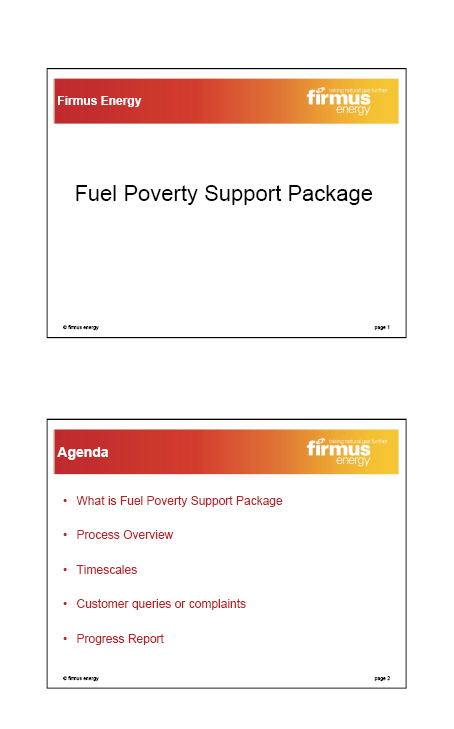
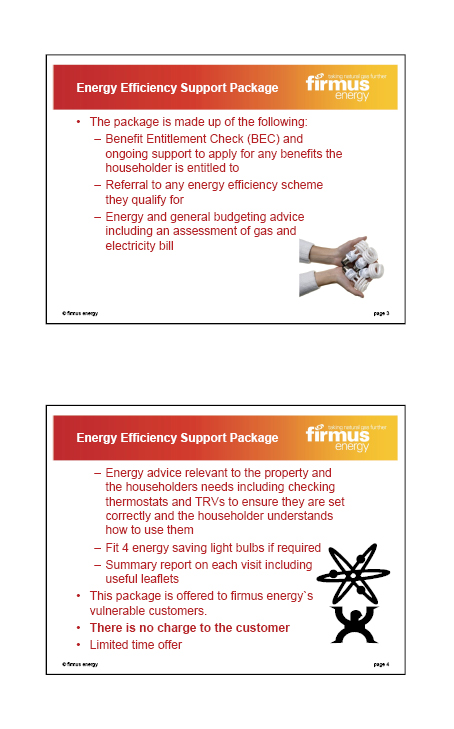
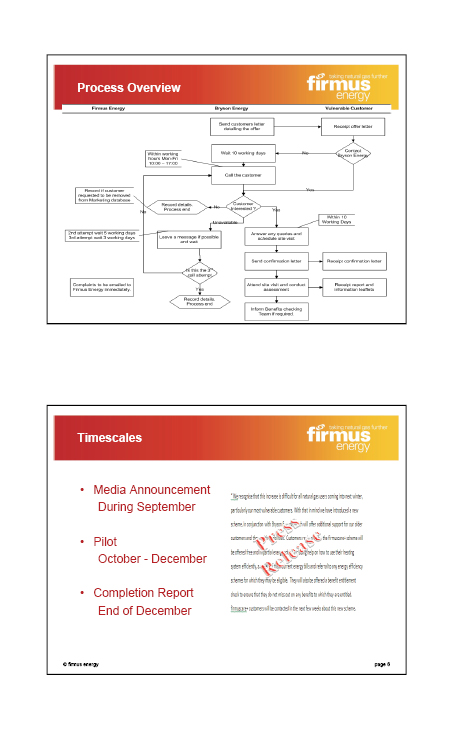
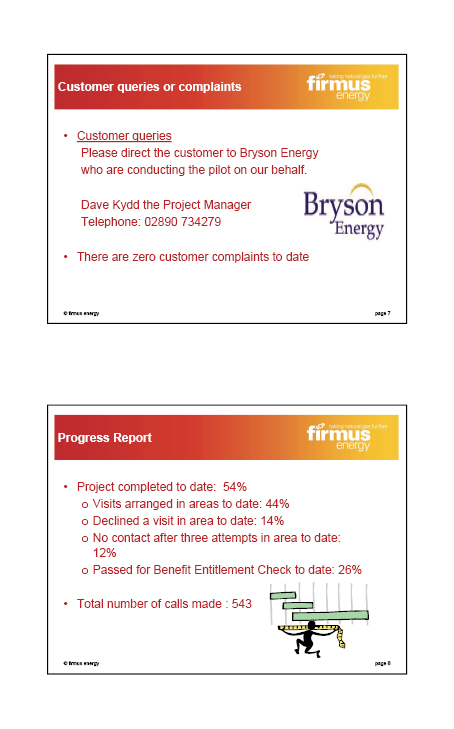

Fuel Poverty Coalition
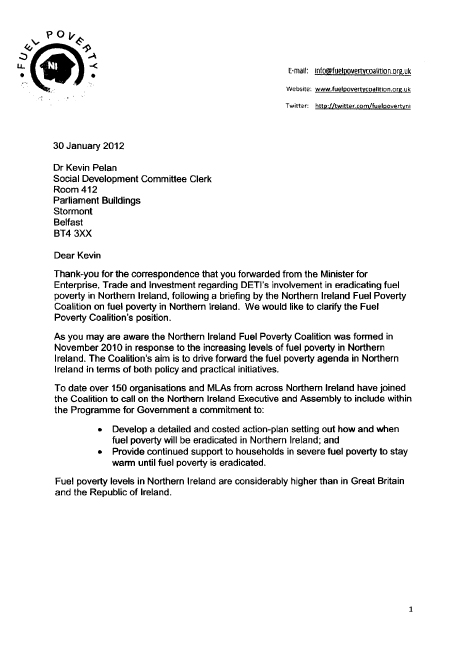
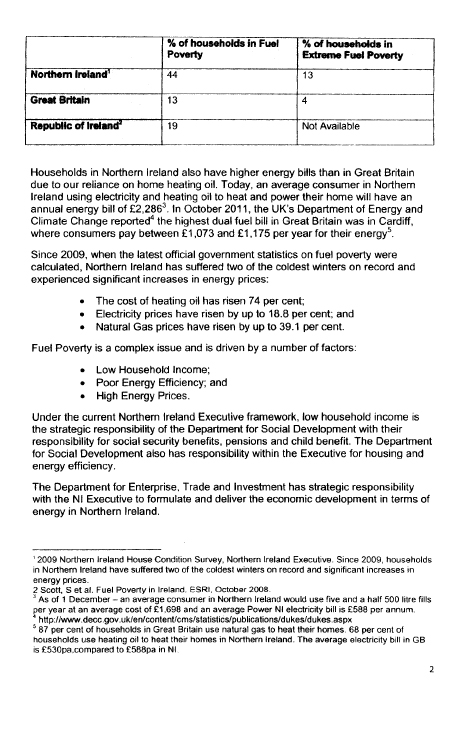
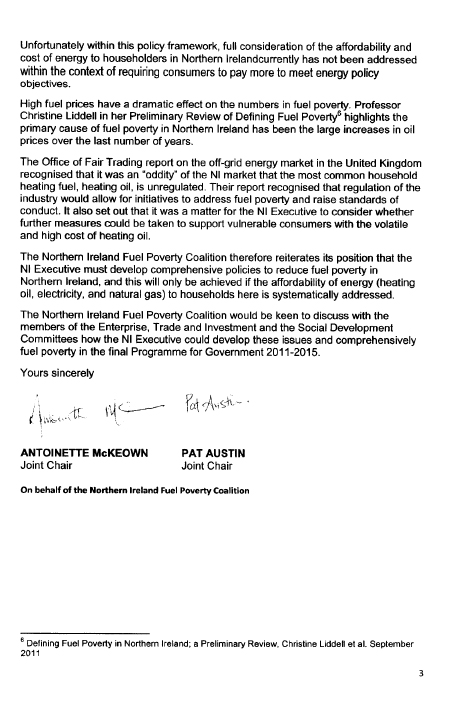
Green New Deal
Northern Ireland
Green New Deal Group
Briefing for Social Development Committee Fuel Poverty Event, 16 November 2011
THE GREEN NEW DEAL AND FUEL POVERTY
The Green New Deal proposes the energy retrofit of up to 60,000 homes over three years from April 2012. The programme will use £12 million allocated in the 2011-15 budget to lever total investment by householders of over £80 million.[1]
The Green New Deal will impact on fuel poverty and health in four ways:
- higher indoor temperatures and therefore better health and well-being;
- a smaller proportion of household income spent on energy;
- the switch from solid fuel to cleaner sources of heating can have significant health impacts on whole communities when it is done at an areas-based level;
- employment created will remove many households from fuel poverty by virtue of income gains.
The Green New Deal will not tackle all fuel poverty in the owner-occupied sector, however. Pay-as-you-save loans will often not be suitable for households in severe fuel poverty if a very high proportion of energy savings are taken in improved comfort, leaving a shortage of cash savings to service a loan.
The Area-Based Approach
A unique feature of the Green New Deal is that it will take an area-based 'street by street' approach which will enable it to reach all fuel poor households and refer those that are eligible to Warm Homes and appropriate NISEP schemes.
This is very much a 'second-best' approach to the challenge of delivering an effective and efficient area-based fuel poverty programme, however. This is because different homes in the same street will be treated by a number of different providers: Warm Homes, Housing Executive, NISEP (several providers) and Green New Deal.
Effective and Efficient Delivery
The solution is to integrate all programmes under the umbrella of the Green New Deal and to deliver via a single provider in any one area. An initial energy and means assessment would determine the level of support available (broadly equivalent to existing eligibility under the different schemes) but with more careful targeting of higher levels of grant support at those most in need.
This integrated area-based method will enable a systematic approach to both fuel poverty and general energy efficiency with households benefiting from the efficiency and economies of scale achieved.
There is an opportunity to move to this integrated approach by April 2013 at the latest with an expected review of Warm Homes contracts in mid 2012 and for the annual renewal of the NISEP schemes.
The Green New Deal should not be seen as a replacement for existing fuel poverty funding but as an important addition and an effective and efficient means of delivering all energy efficiency programmes.
[1]The offer to householders: The Green New Deal will offer a 'one-stop-shop' service for owner-occupied households comprising a menu of energy saving measures from which a package appropriate to the property and customer will be designed and delivered. A finance package including eligible grant funding and loan finance options will be offered. Installation, inspection and after sales service will be included in the deal.
Pay-As-You-Save is central to the proposal. Instead of paying for energy investments in their homes up-front, householders will be able to use the savings they make on their energy bills to repay a loan over a number of years. Usually they will see an immediate saving on their annual energy bill as well.
A mutual company: Established as a mutual company for customer benefit, the role of the Green New Deal Trust will be to assemble the necessary finance and outsource its application and administration to experienced partner organisations.
District Councils: Northern Ireland's councils have a new power to promote energy efficiency in domestic housing under Section 23 of the Housing (Amendment) Act (Northern Ireland) 2011. District Councils will be invited to propose neighbourhoods for Green New Deal projects and to form partnerships with Green New Deal 'Providers' selected through a procurement process.
A total of 50,000 homes will receive energy retrofits over three years. All will receive grants ranging from £150 for loft insulation to £5,000 for external wall insulation. Two thirds of households are expected to require pay-as-you-save loans.
Housing Council
Fuel Poverty
Fuel Poverty has been a matter of great concern to the Housing Council for some time. Last winter has increased the profile for this issue, however it is not being given the priority it deserves by government.
Predictions are that the weather conditions this winter will be more severe than last year. People are experiencing financial difficulties with the economic downturn, increased fuel prices, inflation and unemployment. As Northern Ireland has a significant 'older' population, a significant number are faced with the dilemma of 'heat or eat'.
The Housing Council are concerned that the level of winter fuel payment has been decreased and would like to see this decision by government reversed.
In relation to the cost of fuel – gas, oil, electricity, the Housing Council would like to see prices brought into line with the rest of the UK. The population in Northern Ireland are faced with higher prices for fuel and are being penalised for not being part of the mainland.
More initiatives need to be introduced and funded by the government to encourage people to upgrade the insulation of their homes, install double/triple glazing, and install more energy and cost efficient heating systems. The current Warm Homes Scheme should be expanded to include the installation of double glazing.
Likewise more initiatives to encourage the use of alternative fuel sources should be developed and supported by government grants to encourage people to reduce the carbon footprint and reduce emissions.
The level of government funding for social and affordable housing needs to be increased to allow for the upkeep of the investment made in improving properties in both the public and private sector. The focus over the past few years has been on the new build programme which has had the consequence of reduced capital funding for improvements schemes for social housing, improvement and renovation grants for properties in the private sector.
A significant improvement to housing conditions has been made over the past 40 years, and the Housing Council fully supports a increased and sustained level of funding for years to come.
The Housing Executive has recently developed a programme to install double glazed windows in all its properties over the next ten years. The Housing Council feel that this is an issue that needs to be addressed immediately and over a much shorter period of time. Government will therefore need to provide additional funding for this to be completed without impacting on other programmes to maintain or improve properties.
The Housing Council perceive a significant impact from welfare reform on those who are most vulnerable in our society. The Housing Council support a degree of regional control over the assessment of housing costs and local housing allowances. Also the Housing Council support the separation of payment for housing costs (Housing Benefit) from Universal Credit.
If Welfare Reform is to proceed, then government need to ensure that it is properly developed and implemented to ensure people are not losing out on benefit entitlement. The Housing Council is concerned about the introduction of Universal Credit, how this will be assessed and implemented at regional level.
In relation to Emergency Response by statutory agencies for the likes of severe winter weather, the Housing Council would like assurance that appropriate protocols are in place and that every effort is being made to ensure those who are most vulnerable are known to the relevant agencies.
Housing Rights Service

Social Development Committee fuel poverty event: Potential solutions to fuel poverty
Context
Housing Rights Service is the leading provider of specialist independent housing advice, training and information in Northern Ireland. It is through the experience of our clients in mortgage and rent arrears that we have witnessed the rise in households struggling financially to meet the increasing costs of the price of domestic energy.
A large number of our clients rely on oil to heat their homes which acts as a further barrier to affordability. Given the sharp increase in the price of oil, many of our clients now cannot afford to heat their homes. This coupled with the continuous increase of the price of living has stretched many families to the brink where they simply do have the money to service to heat their homes during the winter months. This has left our clients advising us they have to do without heating for periods of time during winter and often rely on oil drums, at an inflated price, as they cannot afford a lump sum payment for a tank of oil. It is because of this that Housing Rights Service believes our clients require both short term solutions as well as long term solutions to help overcome fuel poverty and ensure they are able to access fuel at an affordable price.
Solutions
Short term
Access to a grant/ affordable loan for fuel
Some Credit Unions have initiatives designed to help people deal with the predicted upcoming winter cold snap. For example in Ballyhackamore, members of the Credit Union are entitled to take out a £500 Winter Fuel Loan to help ease the costs of keeping their homes warm in the coming months. The loan must be paid back within six months, at the rate of £19.85 per week.
Housing Rights Service believes that Government should help credit unions replicate this model across Northern Ireland to allow people to access an affordable loan to help them heat their homes. This solution would give people immediate access to monies and prevent them buying expensive oil drums or, in the worse case scenario, having to go without heat during the winter months.
Long term
Social tariffs
Housing Rights Service believes that some form of social tariff is needed in Northern Ireland, similar to what was introduced in 2011 in Great Britain. The introduction of a social tariff would present a long term solution to help eliminate fuel poverty in Northern Ireland, effectively targeting those most disadvantaged in society and protecting them against unaffordable energy costs. As well as introducing a social tariff, Housing Rights Service would welcome broadening the criteria to help other vulnerable people, to include children and young people and those with long term health conditions.
Regulation of the oil industry
The price of oil has continued to increase at an alarming rate, meaning many of our clients simply cannot afford to hear their homes. Regulation of the oil industry would provide major benefits for the 70% of households who use oil to heat their homes in Northern Ireland. This would ensure that our clients are paying a fair price for oil and are afforded some protection against sharp increases in the price of oil and stabilise the market.
Support to switch to gas
Housing Rights Service believes the Government should examine incentives and schemes to help encourage households in Northern Ireland to move from oil to natural gas central heating. It is imperative that people are encouraged and given the necessary information to help them make informed choices.
Irish Congress of Trade Unions
Potential Solutions to Fuel Poverty in NI.
Irish Congress of Trade Unions Northern Ireland Committee (NIC) is the representative body for 36 Trade Unions with 250,948 members across NI. It is the largest civil society organisation in NI.
NIC recognises that there are major factors which contribute to fuel poverty in NI, these include:
- Poor household energy efficiency
- Low income
- Expensive fuel costs
NIC sets out very briefly below their strategy for eradicating fuel poverty in NI.
1. This issue must be a high priority for Government. Government must demonstrate by word and deed its commitment to the eradication of fuel poverty.
2. Better support and advice to be available and accessible to consumers. It is recognised that those most vulnerable are at most risk, for example those with disabilities, older people, the very young, those living in poverty. It is known that debt is an issue linked to fuel poverty with people borrowing money through friends, relatives and the social fund to pay for fuel. Rural areas are also an area of particular concern. Support and advice should also include making people aware of benefits that they are entitled to and that in many cases go unclaimed. NIC oppose the cuts in welfare benefits and believes that these cuts and fuel poverty are inextricably linked.
3. Better and more investment in insulating new housing, improvements in social housing stock, private sector grants, restoration of the cuts to winter fuel payments and a guarantee of cold weather payments.
4. Energy Bundling. Government should investigate with urgency purchasing the entire supply of home heating oil at discounted rates and provide it to suppliers on the basis of a fair and reasonable rate being charged.
5. Investigate the bundling of coal energy, as prices have remained relatively low (due to the geographic areas of sourcing coal as opposed to oil). This must be looked at fully incorporating the Green New Deal.
6. More investment in the 'new' energy sources, solar, hydro and wind. Making these sources more accessible and cheaper to the consumer, again these sources must be fully compliant with the Green New Deal.
7. NIC supports National Energy Action in its call for the provisions of the Energy Bill to be extended to NI this would enshrine in law a requirement of Energy Suppliers to provide help and assistance to customers with the aim to reducing fuel poverty. NIC supports NEA NI in its belief that the Northern Ireland Authority for Utility Regulation should hold similar powers outlined in the Energy Bill.
Pauline Buchanan
Equality and Social Affairs Officer
Irish Congress of Trade Unions.
Macmillan Cancer Support
Committee for Social Development
Potential solutions to fuel poverty in Northern Ireland – 16 Nov 2011
Response from Macmillan Cancer Support
Key points
- The number of people living with cancer is growing. There are currently 55,000 cancer survivors in Northern Ireland and, if current trends continue, this is set to double by 2030.
- Cancer patients can feel the cold in particular due to the effects of treatment, being at home for longer & the potential drop in income during treatment.
- Macmillan paid out more than £306,860 in grants to cancer patients in Northern Ireland to help them meet the cost of home heating in 2010.
- This is a 52 per cent increase from 2005 when £202,150 was spent.
- Macmillan strongly welcomes the recent funding announcement by the NI Executive to help maximise benefits uptake in the hospital setting by people affected by cancer
- Macmillan wants the Northern Ireland Executive & Assembly to continue to press Westminster to keep the winter fuel allowance at previous levels.
- Macmillan would like the NI Executive to initiate a winter fuel allowance for people under the age of 60 with a terminal diagnosis of cancer
Contact
Heather Monteverde
General Manager for Northern Ireland
Macmillan Cancer Support - 478 Castlereagh Road - Belfast BT5 6BQ
apoole@macmillan.org.uk
National Energy Action
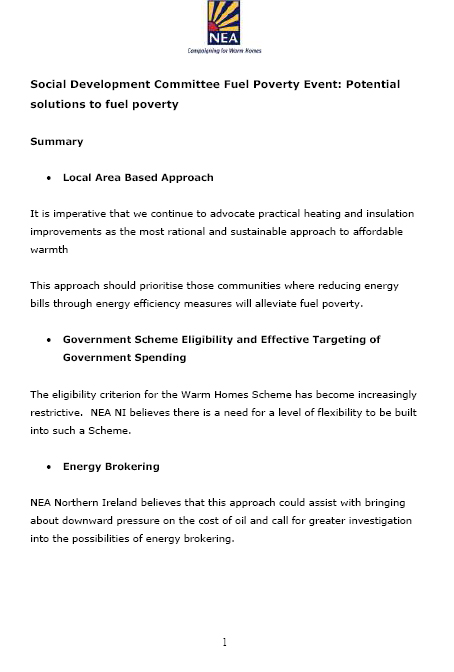
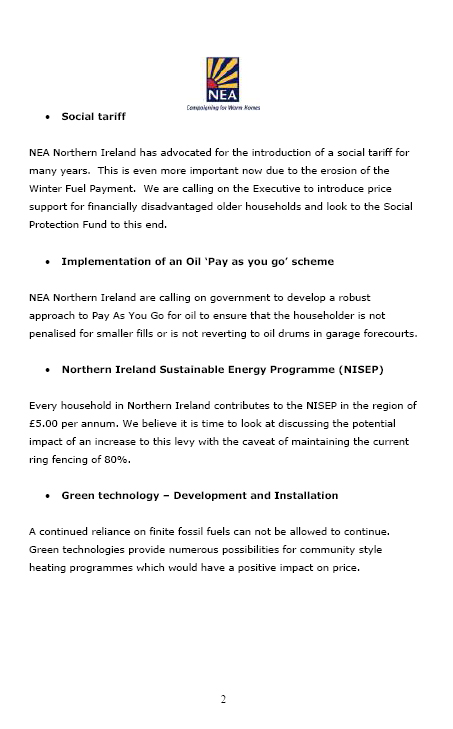

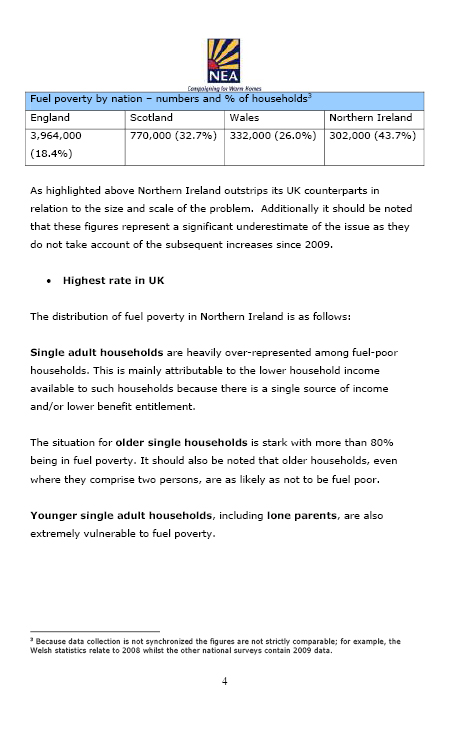
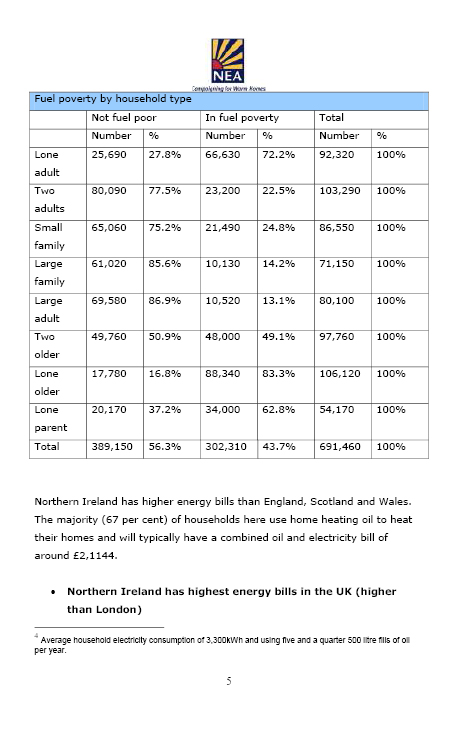
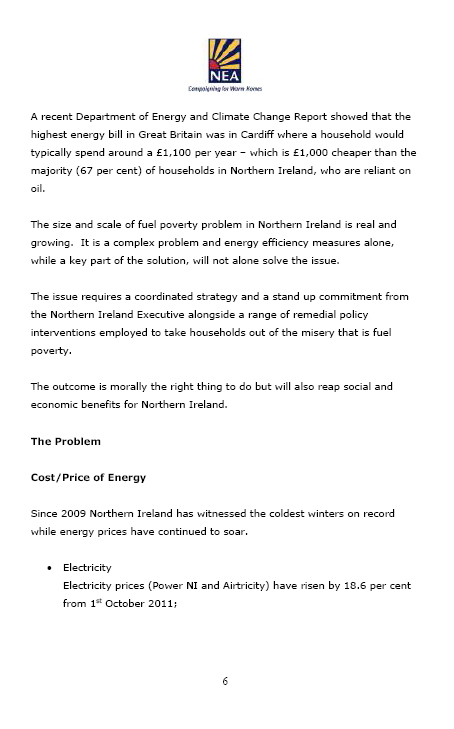
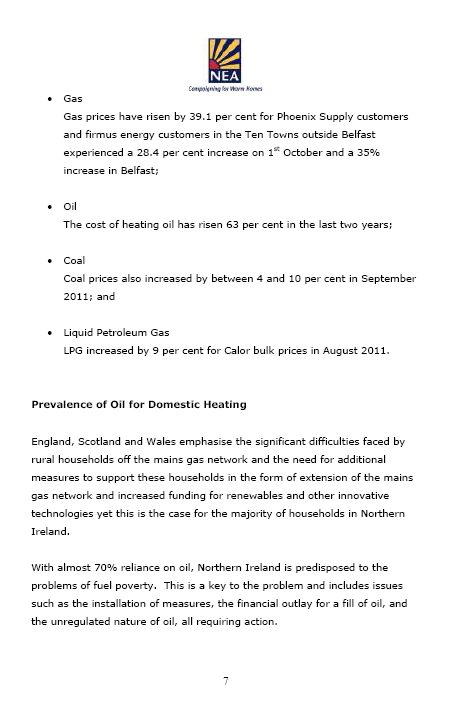
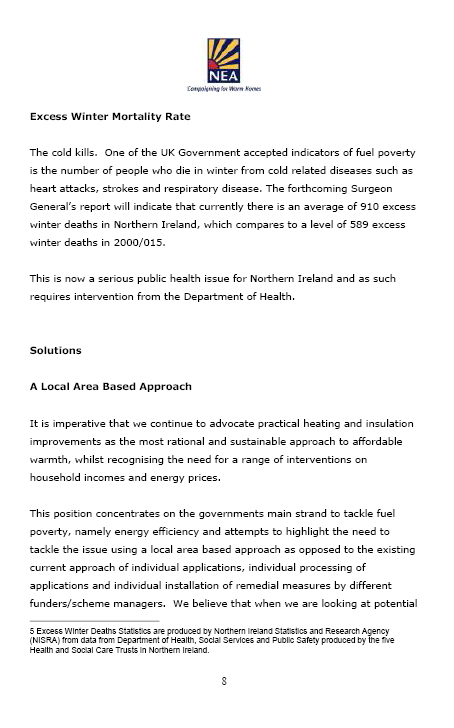
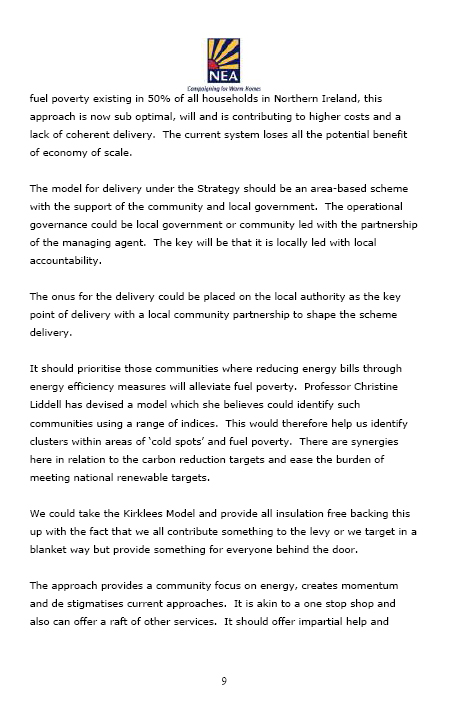
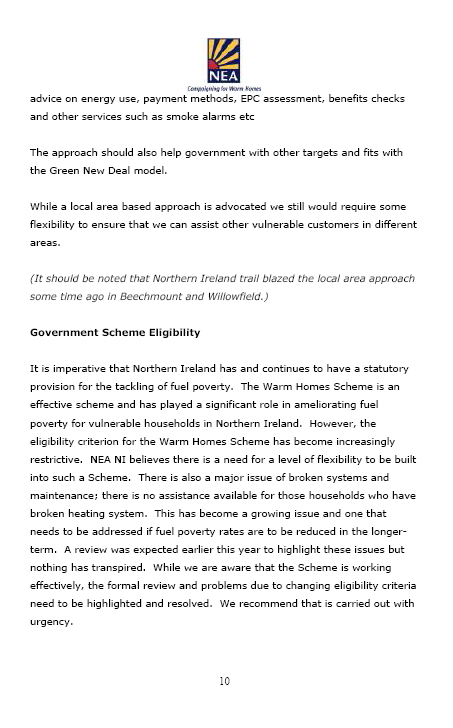
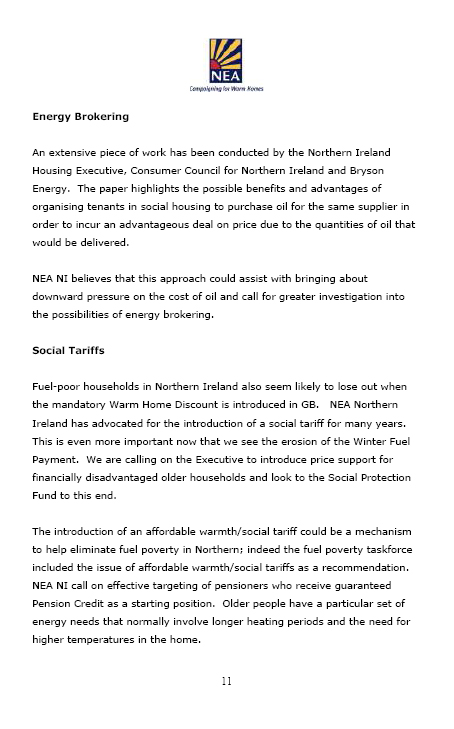
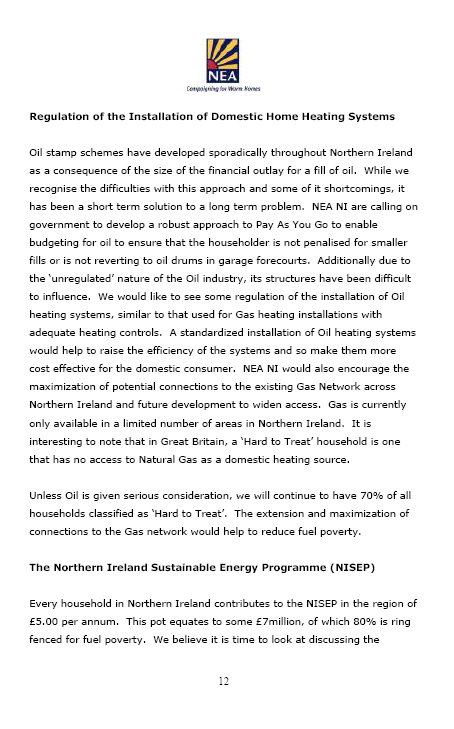
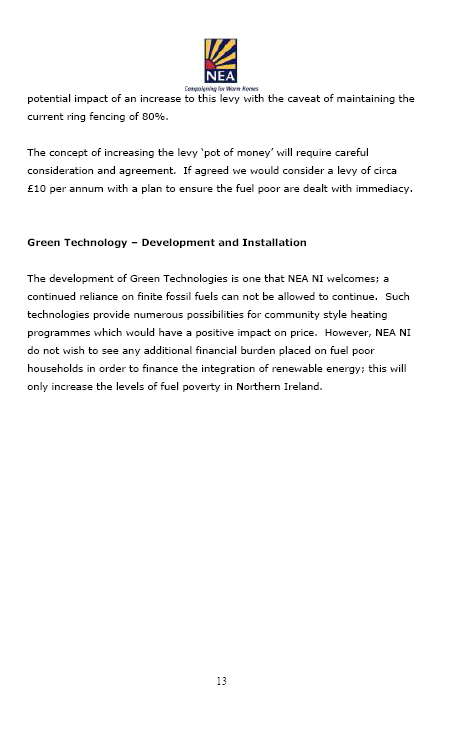
Newtownabbey Methodist Mission, Rathcoole, Newtownabbey
Note to Committee for Social Development
Rathcoole has long been identified as an area of need and the Mission as part of the community has tried to assist with general levels of poverty in this area.
One of the ways which we have found to be effective is to work closely with local partners who are in direct contact with those who are having financial difficulty. We have been able to build strong relationships with social workers, health visitors, and our local Citizen's Advice Bureau.
These "agents" make referrals to us on an ongoing basis but specifically at Christmas when we operate a scheme to help families and individuals who are in need.
In 2010 our scheme helped over 170 families in the general Rathcoole area at Christmas by providing a voucher which the families could "purchase" food through an agreement with our local Spar. This voucher could be used to top up electricity cards as well as buying food, leaving their own income to go towards oil/coal etc.
Throughout the year we also receive referrals for those who are in urgent need of help, usually from CAB and we provide a one off voucher again for use in the local Spar. This system works well because CAB carryout benefit checks to ensure that the people are receiving all eligible assistance before we are requested to help. This also ensures we are only helping genuine cases of need.
Our scheme in 2010 gave out almost £10,000 in aid and throughout the year helped 240 families. This is possible due to fundraising efforts and support from local businesses and individuals. We feel that we have been effective in helping those in greatest need because of the direct contact with those agencies on the ground.
This year we have also been requested to be a partner in the Heat or Eat campaign which uses similar criteria to identify those who are struggling financially. This scheme provides oil vouchers to help with the costs of heating at Christmas.
This type of direct help, targeted to 'those in real need' has proved to be successful and while it requires the involvement of statutory agencies and the voluntary sectors, it is reaching those in need. It is an effective system already operating and in terms of Government support this could be "good value for money" and has no associated costs other than any direct funding.
Fuel poverty is an increasing problem to our communities and much pressure is being put on families to be able to provide heat in their homes. We believe our scheme helps to tackle fuel poverty by alleviating the stress on families by providing crisis financial assistance in the form of the Voucher Scheme. This allows families to free up money in order to pay for fuel and helps the stress associated with such decisions and dilemmas.
Northern Council for Voluntary Action
Committee for Social Development
Fuel Poverty Event
16 November 2011
NICVA - Summary of potential solutions to fuel poverty in
Northern Ireland
In Northern Ireland, the number of households affected by fuel poverty has increased significantly in recent years. The rate of fuel poverty in Northern Ireland is now 44% (302,300 households), a rise from 34% (225,600 households) in 2006[1]. This worrying trend, coupled with the adverse effects of the current economic downturn and proposed changes to welfare reform, make fuel poverty a priority issue that needs to be addressed.
NICVA would like to see a three pronged approach taken in regards to tackling fuel poverty;
- Make fuel more affordable
- Maximise benefit uptake for those most in need
- Ensuring houses are more energy efficient
NICVA welcomes the Committee for Social Development's identification of fuel poverty as an issue that requires urgent attention and views this submission as an opportunity to assist in addressing the problem.
Some of the potential solutions to fuel poverty in Northern Ireland are:
- Maximisation of benefit uptake – more needs to be done to encourage people to undertake benefits checks and benefits uptake, both by making the application system simpler and by developing the capacity of individuals in applying for benefits.
- Energy efficiency advice provision should be extended and publicised throughout Northern Ireland.
- Ensure that the Winter Fuel Payments scheme continues.
- Warm Homes schemes should continue and aim to reach those most in need.
- A regional retrofitting programme should be developed as part of the Green New Deal. NIE Energy (now Power NI) with DSD rolled out a pilot programme in 2008 as a preliminary trial and should be used as a basis for a region wide programme.[2]
- Government also needs to continue work with the energy industry to ensure consumers pay a fair price for fuel.
- 99 per cent of Northern Ireland energy needs are met by imported fossil fuels and this threatens our energy security. Therefore, priority (and financial resources) should be given to the development of local renewable energy resources from wind power, tidal power and biomass fuels. The government should develop a long term (ie 40 year) Energy Strategy which sets clear targets to reduce overdependence on fossil fuel and increase energy production for renewables.
To summarise, a recent Joseph Rowntree Foundation report on tackling fuel poverty[3] informs us that as energy prices rise, fuel poverty can only be reduced by an intensified focus on the energy efficiency and energy bills of those in fuel poverty, especially low income vulnerable households. The long-term solution to fuel poverty, and one that also supports the objective of reducing carbon emissions, is to increase dramatically the energy efficiency of the houses of fuel-poor households.
This will help to alleviate the impact on financially disadvantaged households whilst ensuring equal access to the benefits of energy efficient policies and this should be a key element of the transition to a low carbon economy and society and one which NICVA fully endorses.
[1] Northern Ireland Assembly (2011) Research paper fuel poverty NIAR 411-11
[2] Liddell, C, (March 2011) Hard to treat homes in Northern Ireland evaluation report, University of Ulster
[3] Eakins, P, Lockwood, M, (October 2011) Tackling fuel poverty during the transition to a low carbon economy, Joseph Rowntree Foundation
Northern Ireland Federation of Housing Associations
Date: 7 November 2011
Subject: Suggestions for relieving fuel poverty in Northern Ireland
Credentials
Housing associations are independent voluntary organisations which provide decent affordable homes for about 34,000 households in N Ireland. The great majority of those households have low incomes, as is evidenced by the fact that 70% qualify for Housing Benefit.
Housing associations are leading the field in the development of energy-efficient homes but there is still a very long way to go to achieving Level 5/6 of the Code for Sustainable Homes.
Suggestions to Relieve Fuel Poverty in N Ireland
1. Increasing the energy efficiency of all new construction and renovation by continuing to enhance the Building Regulations
2. Providing enough grant to registered housing associations to enable them to exceed the Building Regulations in terms of energy efficiency
3. Urgently provide tangible financial and other support to start implementation of Northern Ireland's Green New Deal
4. Dramatically increase investment on renewable energy production that suits N Ireland's natural conditions
5. Implement a street by street door-knocking campaign in low-income areas to provide energy efficiency advice, benefits uptake and sign-posting to residents
6. Encourage tangible inter-Departmental co-operation that recognises that the benefits of one Department's investment programme may manifest themselves in a different government Department
7. Encourage the installation and use of Smart meters
8. Demand that DETI make maximum use of the lifting of the previous restrictions on the use of the European Regional Development Fund for energy improvement of housing
9. Maximise the uptake of budgeting schemes to help households meet their energy bills
Northern Ireland Catholic Council for Social Affairs
Briefing paper for Social Development Committee Fuel Poverty Event from the Northern Ireland Catholic Council on Social Affairs (NICCOSA)
About the Northern Ireland Catholic Council on Social Affairs
The Northern Ireland Catholic Council on Social Affairs is the Northern Ireland sub-committee of the Council for Justice and Peace of the Irish Bishops' Conference. With a membership of mostly lay Catholics with relevant experience and expertise, NICCOSA provides advice and support to the bishops of Northern Ireland on social, legal and political issues. The Council is chaired by Cardinal Seán Brady, Archbishop of Armagh and President of the Bishops' Conference, assisted by Bishop Noël Treanor.
In relation to issues of poverty NICCOSA is not a service provider, but works in consultation with other organisations which provide financial support and assistance to those affected, supporting this work through awareness-raising and advocacy to Government.
Responding to Fuel Poverty
NICCOSA's response to Fuel Poverty is situated in the context of its response to the wider issues of poverty and social exclusion as outlined in its 2010 publication Challenging Poverty in Northern Ireland (Belfast: St. Mary's University College, 2010). This report was produced in collaboration with St. Mary's University College, Belfast and the Society of St. Vincent de Paul (SVP) (a copy of the report can be accessed at www.catholicbishops.ie/niccosa).
The Council's response to these issues is based on a firm commitment to the common good – every member of our society needs to be supported in achieving his or her potential. Poverty in our society impoverishes everyone because it can cause those affected to feel isolated and can represent a significant barrier to their participation in society.
Fuel poverty is a particular concern, especially at the present time of year, because of its impact on some of the most vulnerable members of our society: children, older people and those experiencing ill-health. In 2010 SVP spent £619,000 on fuel for those in need. This amounted to a 30% increase on the amount provided in the previous year and represented 23% of all financial support provided by the Society.
In Challenging Poverty in Northern Ireland, NICCOSA advocates a partnership approach to addressing issues of poverty, involving collaboration between Government Departments, with community and voluntary organisations and with the people affected. In this light we welcome the leadership shown by the Social Development Committee in organising this Fuel Poverty event.
Solutions to Fuel Poverty
While urgent action specifically targeted at addressing fuel poverty is vital at the present time, NICCOSA wishes to stress that fuel poverty is only one symptom of the wider problem of poverty and social exclusion. In the long-term, levels of fuel poverty will only be reduced to the extent that we succeed in addressing the causes of poverty, ensuring that all members our society have an income that is sufficient to meet their basic needs.
In the medium term, initiatives aimed at engaging with fuel suppliers in order to allow people to save money towards the cost of their winter fuel throughout the year should be examined. SVP operates an Oil Stamp Scheme in NI whereby people can buy stamps worth £5 each that are redeemable with oil suppliers (many local shops and Post Offices help by selling these stamps on behalf of SVP); in many cases SVP will also provide some of these stamps free of charge to people to help them get started saving. In 2010 the Oil Stamp Scheme had a turnover of £1.6m.
In the short term it is vital to ensure, firstly, that adequate support is available to protect those at risk of fuel poverty this winter. Secondly, this support needs to be easily accessible for those in need. Finally, there is a need to use all available mechanisms and structures – notably collaboration with community, voluntary and faith-based groups – to ensure that information about available supports and how to access them reaches those who are most vulnerable to fuel poverty.
Further Information
If you require any further information please contact the NICCOSA Research Coordinator:
Dr. Nicola Rooney
Research Coordinator
Northern Ireland Catholic Council on Social Affairs
Columba Centre
Maynooth, Co. Kildare
Tel. +353 1 5053016
Fax. +353 1 6016401
E-mail nicola.rooney@iecon.ie
Northern Ireland Housing Executive
Briefing from Housing Executive - Fuel Poverty Event 16th November 2011
The definition of fuel poverty used by all Departments is: "A household is in fuel poverty if, in order to maintain an acceptable level of temperature throughout the home, it would have to spend more than 10% of its income on all household fuel". The term "all household fuel use" includes all fuel of any type, used for space heating and all electricity used for other purposes, such as water heating, cooking, lighting and use of appliances. Fuel poverty is therefore not simply about the ability to pay heating bills but also electricity bills. Fuel poverty has three main causes:
- Poor thermal efficiency of dwellings
- Low household income
- High fuel prices
It follows, therefore, that if a problem has three causes, action must be taken to deal with all three causes. Too often in the past, the focus has been on only the energy efficiency aspect of fuel poverty. But now there are many households in energy efficient dwellings who remain fuel poor due to low incomes and high fuel prices; The Housing Executive would suggest the following actions;
Energy Efficiency;
- Continue investment in insulation/high efficiency boilers across all tenures
- Encourage more householders to replace fossil fuel based heating systems with renewables such as wood pellet boilers
- Amend building regulations to demand higher levels of energy efficiency in future dwellings or when doing major upgrades to existing stock
- More R&D in alternative heating solutions for NI such as community based heating, locally produced geothermal heating or use of waste heat from power plants, industrial plants, etc…
Incomes
- Increase in basic state pension for those for whom this is their sole income
- Winter Fuel Payment should be increased – reinstate recent reduction
- Quantity of free fuel for pensioners in winter paid for by the Winter Fuel Payment. Rather than WFP being paid in cash, it is credited to either gas or electricity bills. Alternatively for customers preferring it to be spent on oil, could Govt broker deals on behalf of pensioners based on WFP.
- Inflationary uplift linked to fuel prices for those on means tested benefit
Fuel Prices
- Government to use its purchasing power for its estate to broker deals on behalf of fuel poor
- Reduce or remove VAT on household energy
- Promote Pay as You Go system for oil heating.
Northern Ireland Oil Federation
Brief for Committee for Social Development
Introduction
The NIOF is a trade body representing the interests of local (Northern Ireland) fuel oil distributors who retail home heating fuel. This brief is in response to a call from DSD who are hosting a meeting with stakeholders with the aim of developing solutions to the issue of fuel poverty.
This paper will outline the current status of the local oil sector and their position in relation to fuel poverty.
Global market
The first point to realise is that oil is a globally traded product and daily price movements are recorded on Platts (an energy and commodity price service). Consumers often refer to movement in crude oil prices for comparison purposes but these are not directly relevant for home heating retail prices. The appropriate comparison is with movements in the prices of refined products/distillates.
These prices move daily and are impacted by global supply and demand, commodity indices, economic trading conditions and currency exchange. There will always be a lag between movements in crude prices and refined prices but supply and demand considerations may mean that they will not always mirror each other.
UK and Ireland
Nationally, the oil sector is probably the most taxed sector in the country. Duty on petrol and diesel coupled with VAT makes up almost 70% of the pump price (road fuels) and is a major contributor to Government funds and no doubt some of this money finds its way to fuel poor schemes. Gasoil and fuel oil are also heavily taxed via excise duty and this has caused major problems for farmers, schools and consumers who use gasoil for heating and has made oil as a heating source uncompetitive compared to natural gas which has no excise duty tax.
Looking specifically at home heat (kerosene) locally, wholesale prices are dictated by the major oil companies who supply Northern Ireland. The local distributor has no control over these price movements whatsoever; the price moves daily and is affected by global oil price movements referred to above. In recent years, currency speculation and movement has played a huge role in oil price movements. As all oil products are priced in dollars so large movements in currency exchange can have a huge impact on wholesale and retail prices.
Wholesale
Oil is brought into Northern Ireland by ship; there are currently three major terminals in Belfast and one in Londonderry. The major suppliers currently are BP; Texaco, Statoil with a small number of traders making up the remainder of supply especially during peak demand periods.
Product is sold on a daily platts price, with the majority of distributors now buying ex rack (from the terminal) due to the high volatility in fuel prices in recent years. Storing large quantities of fuel in a volatile market can be a high risk strategy for the smaller distributor.
Size and scale
NI has approx. 250 distributors catering for around 500,000 homes*. It is a highly fragmented but very competitive market with retail prices in the local market often being below the UK average.
This is substantiated in the regional summary for October 2011 (Sutherland) **the average cost for heating an average 3 bed house in the UK with oil is £1585 pa for a non condensing boiler and £1296 pa for a condensing boiler. The annual cost for NI is £1562 and £1278 respectfully; 1.4% below the national average.
*Figures from NIHE home condition survey 2010 ** Sutherland Tables (Independent Energy Consultants)
If we look at the ROI (at approx. 0.85 euro to pound) NI consumers buy kerosene some 10% cheaper that their ROI counterparts.
Kerosene is the product widely used for home heating purposes. The primary driver of
price increase is the crude oil price, which as reported by the OFT accounts for over 90 percent of the variation in the retail price of heating oil. The remainder is split between storage/ freight and VAT. This leaves approx. 8-10% for distribution costs and profit.
As can be seen below NI distributors are at the bottom of the table when it comes to profitability well and below the UK average; NI distributors receive the lowest return in the UK market hence offering better value to consumers.
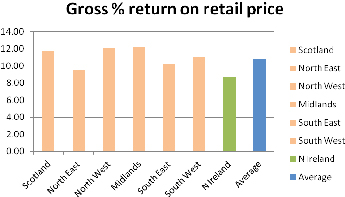
Source; Fuel Price Totem 2009/10 AnDPublishing
Profitability
The reality is that while the price for all forms of energy has increased in recent years, local oil businesses in Northern Ireland have seen their percentage return drop steadily since the 1990s. This is despite the cost of running a distributor business rising steeply in recent times.
This point is explored in the following table; compared to the regulated sectors where a return is guaranteed for the energy provider, the returns in the local distribution sector are very low.
| Company | Turnover (thousands £Stg) | Profit before Tax (thousands £Stg) | % return on T/O | Year End |
|---|---|---|---|---|
| Scottish Power Renewables | 182,900 | 88,800 | 48 | 2009 |
| Coolkeeragh | 192,109 | 58,074 | 30 | 2009 |
| AES Kilroot | 130,881 | 36,793 | 28 | 2009 |
| AES Ballylumford | 165,847 | 42,861 | 25 | 2009 |
| NIE | 228,500 | 24,000 | 10 | 2011 |
| Phoenix Supply Ltd | 106,382 | 3,168 | 2.9 | 2009 |
| Nicholl (Fuel Oils) Ltd | 287,919 | 5,452 | 1.9 | 2010 |
| Lissan Coal Co Ltd | 250,659 | 4,479 | 1.8 | 2009 |
| DCC Energy Ltd | 224,990 | 3,009 | 1.34 | 2010 |
| Maxol Direct Ltd | 165,945 | 1,478 | 0.90 | 2009 |
| AH Fuel Oils Ltd | 70,782 | 303 | 0.43 | 2009 |
Source; Top 100 Companies – Ulster Business
From the table above it is clear that there is a marked difference between regulated fuels and non-regulated fuels (in terms of profitability). The regulated fuels benefit from a guaranteed return (as set by the Regulator) which is clearly much higher than the local distribution sector as evidenced by these results. It could be argued that market forces and competition has been beneficial for oil consumers locally as the evidence would suggest (and confirmed by the OFT) that competition has driven down price and returns in the oil market, compared to the regulated fuels.
The facts are that at the current level of return there is no opportunity for reinvestment in the local oil distribution business. This has severe implications for the future of a viable home heat sector in Northern Ireland. While our competitors are actively promoting energy efficiency and offering loans to consumers to benefit from best practice the local oil sector has not been able to develop such schemes due to limited profitability.
Fuel Poverty
There is little doubt that the impact of fuel poverty is felt across the Province and this has been exacerbated by the recent economic downturn and increasing energy costs. However, heating and insulation measures alone are not enough to move low-income families out of fuel poverty.
In recent years the oil trade (boiler manufacturers) has attempted to assist in the alleviation of fuel poverty by producing oil boilers that have increased efficiencies resulting in lower fuel bills and cleaner emissions. A modern condensing boiler offers an immediate 18% increase in efficiency over a similar standard non-condensing boiler.
The distribution industry has recognised that many oil customers moved from solid fuel and introduced an electronic pre-payment system to facilitate weekly payments. This assists customers who find difficulty with lump sum payments and permits budgeting. The industry in Northern Ireland has assisted customers who have presented themselves as 'disadvantaged' and provided fuel on a goodwill basis (with the client agreeing to a pre-payment scheme for future oil purchase).
The industry would welcome the introduction of a competent person's scheme or legislation to ensure that oil systems were installed correctly. Recent statistics from the NI House Condition Survey suggested that up to 75% of private sector installations are sub-standard. This has serious implications for efficiency and emissions. If such a scheme was extended to servicing major savings could be made by householders assisting the fight against fuel poverty and would assist reduce carbon emissions.
Potential Solutions for Fuel Poverty – Committee for Social Development
It has long been recognised that there are three factors to fuel poverty; the price of fuel, energy efficiency (house and heating appliance) and consumer income. While it is easy to blame the cost of the fuel, the reality is that without a combined approach to all the factors the problem will not go away.
If we examine the three factors –
Cost of fuel
This is outside of the control of the local oil sector. In a recent OFT report it states, "the primary driver of price increases is the crude oil price, which accounts for over 90 per cent of the variation in the retail price of heating oil". Local oil distributors respond to international prices which move daily and have no control over wholesale prices.
There are measures that Government can take to reduce the cost of kerosene. This product currently attracts VAT at the rate of 5% in the UK and a proposal to Treasury that this could be removed for vulnerable/elderly consumers could be initiated.
Income
Consumer income is a Government matter and the oil sector cannot address this issue. Government locally and nationally needs to review the state pension, winter fuel payments and other measures to assist fuel poor clients that have not moved with inflation over recent years. A combination of advice on spending habits/prioritising of bills and grant aid towards insulation and heating measures will be required.
Efficiency
In recent years the oil sector has promoted condensing boilers that offer annual oil savings of approx.18%. This combined with efficiency measures (Including loft, cavity wall and heating controls) can substantially reduce the oil households annual spend.
Oil boilers are very efficient if installed and maintained correctly. According to SEDBUK (seasonal efficiency database) the most efficient boiler is an oil boiler with an efficiency rating of 93.3% and this compares favourably to the top natural gas boiler at 90.3% and LPG at 91.4%.
We encourage consumers to upgrade to oil condensing boilers and recent legislation has endorsed these appliances but there is limited enforcement of this regulation at a local building control level.
Looking to solutions the oil industry would be keen to explore;
Boiler scrappage – a Government scheme to encourage oil consumers to replace older inefficient appliances with modern condensing boilers – this would save consumers money immediately. This could be part funded by a levy on kerosene imports and discussions with DETI and DSD have started on this issue.
The Warm Homes Scheme provides a heating and insulation upgraded/install for fuel poor (receipt of benefits and pension credits) but there is no such scheme for the 'working fuel poor' earning in excess of £10K pa – serious consideration should be given to extension of this grant to families/individuals in working fuel poverty.
Winter fuel payment paid in the form of a fuel voucher redeemable against fuel only.
PAYG option for fuel poor/elderly clients. One of the hurdles to new oil consumers is the initial cost to fill the tank with oil. An initiative to offer PAYG option is currently with DSD and we would welcome support for this initiative in terms of DSD funding to minimise risk.
Budgeting advice – the NI consumer is very poor at budgeting for energy bills. Advice should be offered at all levels to enable consumers to budget for an oil fill using the numerous options available.
David Blevings
NIOF 14 Nov 2011
Older People's Advocate Office
Response to the Social Development Committee
Introduction
The cause of fuel poverty amongst older people is that so many of them have very low incomes, indeed many live entirely on the state pension which is not increasing to keep pace with the cost of fuel and food. The poverty faced by older people on a daily basis manifests itself in many different ways including:
- living in poorly maintained housing
- an inability to leave home which leads to isolation
- a deterioration in physical and mental health and wellbeing due to the environment
- having to make choices about eating or heating
1. Government Working in Partnership
Fuel poverty cannot be addressed in isolation but must be part of a package which addresses the other symptoms of and contributors to continuing poverty. This will require a commitment in the Programme for Government to develop cross-cutting, cross-departmental actions and programmes with clear measurable outputs to demonstrate how the negative impact of poverty is being reduced across groups such as older people.
2. Setting Targets and a Fuel Poverty Index to Better Target Resources
Clearer definitions of what poverty means in day to day living need to be developed so that those who are most at risk from the effects of poverty can be clearly identified and their needs addressed. This will include not only identifying those most in need but also taking account of those who in terms of assets fall just outside eligibility for additional benefits but who because they are asset rich but in reality are cash poor (perhaps by virtue of owning a property which is expensive to heat and run) may be even worse of than those who fall within the eligibility band.
3. Affordable Energy
Energy must be made more affordable by encouraging greater choice through the use of targeted grants to decrease dependency on oil and it should be a requirement of all new build that it provides such choice. The use of social tariffs should be tried.
4. Removing Energy Inefficiency as a Cause of Fuel Poverty
Further targeted programmes to insulate older properties particularly those 'Hard to Treat' properties built before 1919 should be implemented so that older people living in such houses can continue to live longer in their own homes without the crippling costs of fuel to heat such energy inefficient properties.
Phoenix Supply Ltd
Potential Solutions to Fuel Poverty
Accelerate Public Sector connections to the gas network
Gas has been made available to around 47,000 NIHE properties and there are around 35,000 already connected. The majority that remain unconnected use oil and electricity as their heat source.
Many of these tenants remain in fuel poverty and as an example the regulated tariff for natural gas compared to heating oil has been around 20% cheaper at present and over the last year it has been around 33% cheaper to use natural gas rather than home heating oil.
The Energy Saving Trust state that by installing a fully controlled high efficiency heating system you could save up to 40% of your heating bill if your existing system is more than 15 years old. In many cases the systems are approaching this age or beyond.
Add to this the convenience of using a Pay As You Go solution for payment and there is a very strong argument for accelerating the installation of natural gas to all public sector housing including housing associations.
Boiler Scrappage Scheme
N.I. was the only region in the UK not to launch a Boiler Scrappage Scheme backed by Government. Phoenix Natural Gas along with others in the Gas Industry combined their resources to fund a scheme for Greater Belfast. The scheme was very well received and sent a very important message that inefficient systems are wasteful of resources and the cost of running them are too high. The Boiler Replacement scheme introduced by the DSD falls under the Warm Homes scheme to help those that were close to meeting the criteria for a free system. The scheme introduced in the rest of the UK had much wider appeal and helped tackle fuel poverty on a wider basis.
Energy Performance Certificates
The introduction of energy performance certificates has been a positive move in helping homeowners understand the efficiency of a home they may acquire or rent. Whilst the report is helpful it lacks credibility in that no action is required to be taken if a home falls below acceptable standards. Legislation could be introduced that requires owners and Landlords to bring homes up to a decent standard before they are either sold or rented. This would have the impact of raising the standards of insulation as well as ensuring that they heating systems were up to standard. Individuals moving into these homes can then be assured that adequate measures have already been taken to improve the energy efficiency of the property and therefore energy bills will be kept to a minimum.
Housing Funded Through Benefits Offices
A large proportion of housing is funded through the Benefits Offices. There are no checks completed on the quality of the properties regarding the suitability for an individual or family regarding fuel poverty. All properties that are funded through this scheme need to be assessed to ensure they meet minimum standards for insulation and heating. Meeting the standard will reduce the costs to tenants and potentially reduce the number of people in fuel poverty.
Maximise Benefits Checks
A number of organisations have been established to provide advice on the levels of benefits that householders are entitled to. Work in this area needs to be improved as much of the advice provided requires action by individuals who are not able, in many circumstance, to complete the necessary administrative process to ensure that they are obtaining all the benefits that they may be entitled to. This would appear at this stage to be piecemeal and uncoordinated and commercial organisations would be keen to become involved in funding a more coordinated approach to this whole issue. There are vast array of schemes each with their own conditions that are not always easy to understand. Energy Supply companies are well placed to establish a one stop shop that would deliver on practical advice to customers. Theses companies are familiar with being able to explain complex issues to customers in an easily understandable manner and they have the systems and procedures available to allow for customer follow up to help ensure that those that are entitled to benefits actually receive them.
Power NI
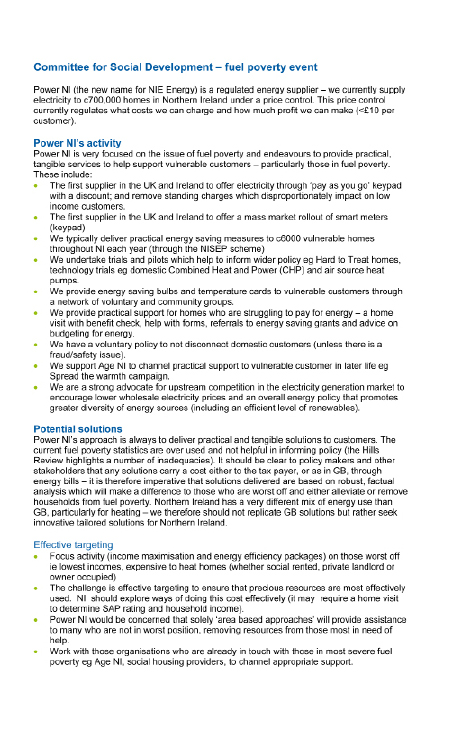
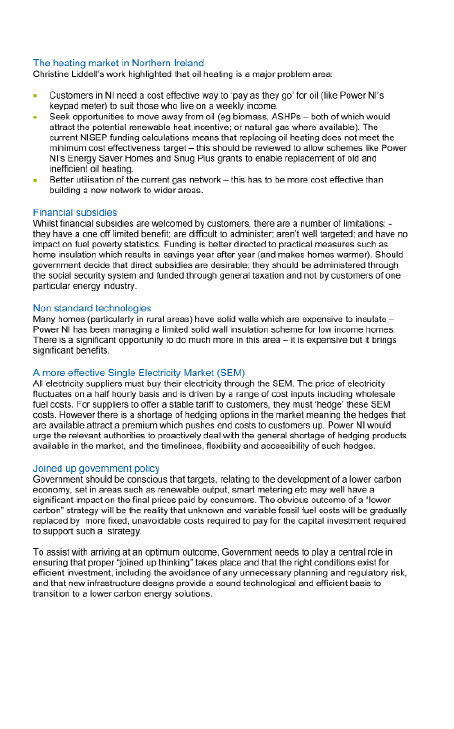
Public Health Agency
PHA briefing for Committee for Social Development- fuel poverty stakeholder event on 16th November 2011
Fuel Poverty & the Public Health Agency
1) Key Figures for NI
Definition: People are living in fuel poverty if they have to spend more than 10% of their income on heating and lighting their home to a reasonable standard of comfort.
'Warmer, Healthier Homes: A New Fuel Poverty Strategy for Northern Ireland' was produced by the Department for Social Development in March 2011.
The report states that...
- Today, more than 44% of people in Northern Ireland live in fuel poverty, a figure
- more likely to rise than fall.
- The recently published Northern Ireland House Condition Survey 2009 shows that 44% of households in Northern Ireland have to pay more that 10% of their income on energy costs. The World Health Organisation defines a satisfactory heating regime as 21oC in the living room and 18oC in other areas, although householders with specific needs may require different levels of heating.
- The number of people living in fuel poverty in Northern Ireland far exceeds the numbers in the other regions of Britain; however,an upward trend is evident in all regions.
- The 2009 House Condition Survey reported the level of fuel poverty in
Northern Ireland as 44% (302,310 households), a 10 percentage point increase from 34% (225,580 households) when the level of fuel poverty was last measured in 2006 by the House Condition Survey. The Survey reported the rate of fuel poverty in age groups 60 – 74 years as 53% and the rate of fuel poverty in 75 years plus age group was reported as 76%. The Survey also showed that 83% of older people who live alone need to spend more than 10% of their income on energy costs and therefore are living in fuel poverty.
2) Public Health Implications of Fuel Poverty
- Every year in Northern Ireland, approximately 1300 people die as a result of the cold.(NISRA) For every person who dies; another 8 people will require treatment by their GP or in hospital for cold-weather related illnesses.
- When people are exposed to the cold, they are at an increased risk of cardiac arrest, strokes, respiratory illnesses and falls. Those most vulnerable to the cold are older people, people with a disability and children.
- As energy costs have risen, heating and lighting one's home has become more expensive. This can be particularly difficult for those on low incomes living in poorly insulated houses with inefficient heating systems. As a result, living in a cold, damp home poses risks not only for a person's physical health but also for their mental wellbeing as the cost of heating may lead to debt or stress.
- Persistent cold, together with the financial worry of being able (or unable) to afford adequate heating, can cause depression. People in fuel poverty are 2.5 times more likely to report high or moderate stress than those able to afford their heating. (Chief Medical Officer's Annual Report for England, 2009)
- Households in Northern Ireland spend more than twice as much of their disposable income on energy than households in London and around 60% more than the UK average. (Warmer Healthier Homes, Department for Social Development 2010)
3) Actions being taken by the PHA
- The Public Healthy Agency invested £467,500 in 2010/11 to combat fuel poverty. The funding has enabled a number of households to receive assistance through energy efficiency advice, insulation measures, whole house solutions, awareness raising sessions, and referrals to grant schemes, access to benefits and development and implementation of local action plans for fuel poverty. This investment has levered substantial funding in energy efficiency grants for householders via the NIE Levy Fund and Warm Homes Scheme
- In addition a significant improvement in household income has been generated through benefit maximisation schemes throughout Northern Ireland as part of the Public Health Agency fuel poverty programmes.
- Additional leverage has also been made available through partnership working including £707,000 in 2010/11 from the Department of Agriculture to the PHA, in pursuit of joint outcomes, through the MARA project.
[The aim of the MARA Project is to improve the health and wellbeing of people living in the top 30% rurally deprived areas in Northern Ireland according to NISRA, by making them aware of, or helping them access, local services, grants or benefits. The households targeted incorporate older people, carers, disabled people, lone parents, ethnic minorities, lone adults, farming families and/or low income families. The programme has target over 4000 households.]
- The Public Health Agency has also established a Regional Fuel Poverty and Health Network whose aim is to develop a more strategic approach to fuel poverty and health across Northern Ireland.
4) Potential Solutions to Fuel Poverty in Northern Ireland
a) Raise awareness of the health impacts of fuel poverty
- Raise awareness of the links between fuel poverty, health and health inequalities
- Increased awareness raising of fuel poverty and services/ support available with front line health staff and the community & voluntary sector to support effective targeting of existing / new fuel poverty programmes
b) Actions to address income levels;
- Continued effort to increase income levels for those living in fuel poverty, through benefit maximisation, access to grants, training and social economy/ employment initiatives and direct assistance, and continued implementation of the regional MARA scheme
- The need for fiscal policy to afford protection to those in greatest need who are affected by fuel poverty
- The need for consideration of the current level of welfare benefit payments for those at risk of fuel poverty
- Create fair employment and good work for all through improved access to good jobs, reduction in long-term unemployment, make it easier for people who are disadvantaged in the labour market to obtain and keep work and improve quality of jobs
- energy efficiency;
- Decreasing levels of fuel poverty through energy efficiency awareness, signposting to services, access to grants and direct assistance schemes
- and fuel prices
- Cross-departmental working to facilitate the achievement of affordable energy for households in Northern Ireland
- Explore options for reducing fuel duty for Northern Ireland
c) Collaboration and partnership working
- Continued commitment to cross-departmental, cross-sectoral working and partnerships to tackle high levels of fuel poverty in Northern Ireland through actions to address income levels, energy efficiency and fuel prices
- Increased sharing of learning across organisations and departments and promotion of the positive impacts of fuel poverty programmes
- The need for consideration of fuel poverty and associated issues within the context of carbon reduction and sustainability
Rural Community Network
Fuel poverty in NI: a rural perspective
- The winter of 2010-2011 was one of the coldest on record for Northern Ireland so it is not surprising that the cost of fuel continues to be a key issue for consumers. In rural areas this is exacerbated by the high dependency on home heating oil and the condition of some rural homes.
- Recent Government statistics show that fuel poverty levels in Northern Ireland are amongst the highest in Western Europe. Currently, 44 per cent of homes here struggle to heat their homes to adequate levels - this is three times as many homes as in England and nearly double the rates in both Scotland and Wales. The picture is even bleaker in rural areas of Northern Ireland, with 46 per cent of homes (95,640) living with the effects of fuel poverty.
- The main reason behind the high levels of fuel poverty in Northern Ireland is that the average household here spends £348 per year more on energy than the equivalent home in Great Britain. Rural homes generally do not have access to the natural gas network and therefore rural consumers are forced into buying more expensive types of fuel such as home heating oil, coal and Liquid Petroleum Gas (LPG). In fact, eight out of ten rural households in NI use oil to heat their home. This contributes significantly to the high levels of fuel poverty in rural areas as a household using oil to heat their home will spend almost £300 per year more on energy than a household using natural gas.
- Poor energy efficiency in homes is another cause of fuel poverty and contributes considerably to fuel poverty levels in NI rural households. The 2009 Housing Condition Survey showed that 63 per cent of NI homes built before 1919 were in fuel poverty. It is three times more likely that homes in rural areas of Northern Ireland will be built before 1919 and of a solid wall construction, which means that they are harder to treat with insulation measures and more expensive to heat.
- A third factor contributing to the high fuel poverty levels in rural areas is the lower income levels compared to urban areas . For example rural areas in Strabane, Moyle, Fermanagh and Cookstown have the lowest average weekly wages in NI. In addition, people in rural areas typically need to spend between 10 and 20 per cent more on everyday requirements than those in urban areas , mainly on higher transport and fuel costs.
Save the Children
Save the Children note for the Committee for Social Development's Fuel Poverty Event, 16 November 2011
Context
Extent of child poverty
Unlike rest of UK, recent official statistics show level of child poverty is increasing in NI.
Poverty is measured according to household income - but fails to take account of inflation which is making things much worse. Soaring energy costs are pushing low income families into more debt or forcing them to choose between heating and eating.
Levels of fuel poverty – the 2009 NIHE figures show 30% of children and young people are living in fuel poverty. 2011 figures are bound to be higher.
Impact of fuel poverty – research highlights the detrimental effect on infant cognitive development, on the respiratory and mental health of young people and adverse impacts on well being, opportunities to study and socialise with friends.
Priorities
1. Cross departmental action on fuel poverty in NI
2. Measures mitigating fuel poverty for families & children living in poverty (a severe weather winter fuel payment; social tariff; retrofitting insulation programmes)
3. Fuel brokering (supported and encouraged by NI Executive)
4. Regulation of the home heating oil industry in NI
Rationale for social tariffs - we note that poorer families are already paying considerably more for their energy than other families as they cannot advance payment discounts such as direct debit discounts and/or purchase oil by the drum, up to 3 times normal rates.
That's why fuel brokering becomes attractive. A not-for-profit energy brokering scheme could greatly reduce oil drum prices both directly and indirectly by increasing market competition.
Retrofitting, as part of a Green Deal, would provide jobs and reduce energy costs - both of which would mitigate child poverty.
Ulster Farmers Union
UFU suggested solutions to fuel poverty in Northern Ireland
The Ulster Farmers' Union (UFU) represents a major component of the Rural Community in Northern Ireland. Our members and associated family own or control the majority of land in Northern Ireland and play a vital role in the economy. Fuel Poverty is a major issue for rural dwellers and is increasingly impacting upon our members, the sustainability of their businesses and on local rural communities.
The UFU would like to make the following suggested solutions as to how we feel this problem can be mitigated against in rural areas;
1. Re-opening and extending of the Farmhouse Insulation Scheme: Farmhouses are often old, stone built properties that are poorly insulted. Previously, there was a Farmhouse Insulation scheme offered by NIE through a grant programme. This scheme offered percentage funding to farm houses to have insulation fitted which in turn made houses easier to heat, reducing demand for oil heating. This was a very effective and successful scheme and the UFU would suggest it was reopened and extended to include all rural homes.
2. Grow the renewable energy sector: There is a growing renewable energy sector in Northern Ireland particularly in wind and biogas energy production. If this is encouraged and barriers to entry are reduced, it has the potential to significantly reduce energy costs thus reducing fuel poverty. This is particularly relevant to rural areas where there is a lack of alternative choice due to lack of infrastructure e.g. natural gas.
3. Rural Road fuel Scheme: Rural dwellers are more likely to be dependent on cars given the limited choice of other means of travel and the necessity to travel to reach services which are being relocated and centralised to urban areas. Due to this dependency, when road fuel price rises rural dwellers have no alternative but to absorb these costs. To account for this, the UFU would suggest that government consider implementing a rural fuel duty rebate for rural dwellers.
4. Price of road fuel: As explained above, rural dwellers have a huge dependency on road fuel. This is also the case for farm businesses that have a huge reliance on rebated fuel to run agricultural equipment. Rebated fuel has also risen significantly in price which has substantially added cost to farm businesses. The UFU would suggest that government consider reducing the tax level imposed on white and red diesel to help reduce the price of fuel. Although this would mean reduced revenue for government, in the long term cheaper fuel would help alleviate fuel poverty and help businesses compete and thrive.
In addition, the UFU would suggest that more is done to ensure that fuel price is more consistent across NI. Rural areas, by virtue of their remote location and lack of competition, tend to have higher fuel prices in filing stations. The UFU would suggest cost of fuel is closely monitored to ensure a more consistent level of pricing across NI.
5. Re-opening of grant scheme for alternative heat sources: Previously, there was a scheme that offered grant funding towards alternative heat sources such as wood chip burners, solid wood burners etc. These grants proved to offer a very good alternative to oil fired heating reducing the reliance on expensive fossil fuels.
Utility Regulator
Northern Ireland Assembly Committee for Social Development Fuel Poverty Event
Background:
The Utility Regulator is a non-ministerial government department responsible for regulating the electricity and gas industries and water and sewerage services in Northern Ireland, to promote the short and long-term interests of consumers. We make sure that the utility industries in Northern Ireland are regulated and developed within Ministerial policy as set out in our statutory duties. While the Utility Regulator does not have a specific statutory duty in relation to fuel poverty, our main duty is to protect all customers. We are also required to have due regard for the interests of vulnerable customers, which in many instances would include those in fuel poverty. For this reason the Utility Regulator takes a keen interest in addressing fuel poverty. While the Utility Regulator does not hold the levers on many of the factors which influence fuel poverty we deliver on actions which help to mitigate the problem by protecting all electricity and gas customers, with due consideration for vulnerable customers.
We drive change such as the introduction of competition into the electricity and gas retail markets to benefit customers.
We deliver price controls where appropriate, which ensure that prices charged to all customers are as low as they can be.
We put safeguards into licences; for example preventing the disconnection of vulnerable customers in winter.
We deliver the Northern Ireland Sustainable Energy Programme (NISEP). The NISEP helps us to meet our duties to the environment and energy security. It also helps the vulnerable because 80% of the funding for the NISEP goes to provide energy efficiency measures for vulnerable customers.
Further work by the Utility Regulator
The Utility Regulator is committed to the implementation of 3rd European Energy Package in a manner which is tailored to the specific and unique circumstances facing Northern Ireland customers and in particular Northern Ireland's vulnerable customers.
The Utility Regulator has carried out a consultation on proposals to improve consumer protection under the Directive these include:
1) Increased transparency of information for all customers.
2) Easier switching for all customers to ensure they benefit from competition.
3) Increased consumer protection to help vulnerable customers avoid disconnection and self disconnection. For example limits on the level of debt which can be collected per pre payment meter top up.
We also work with government and stakeholders to bring forward and develop potential solutions which are cross cutting in nature.
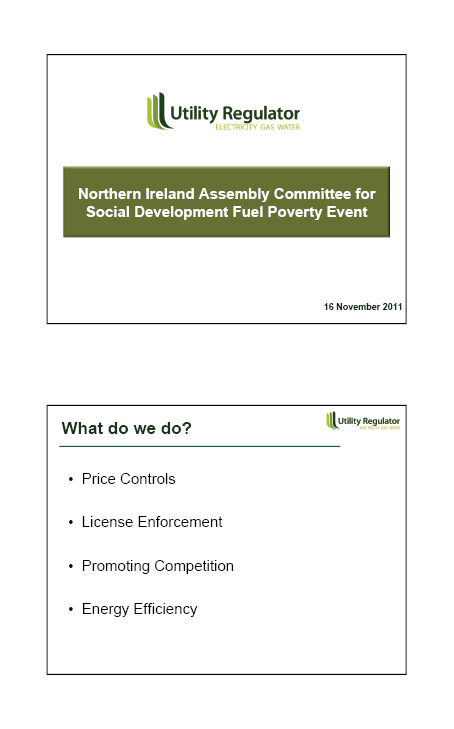
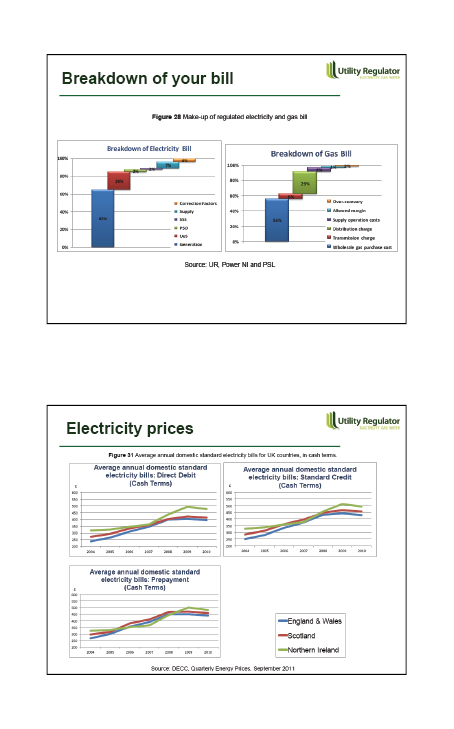
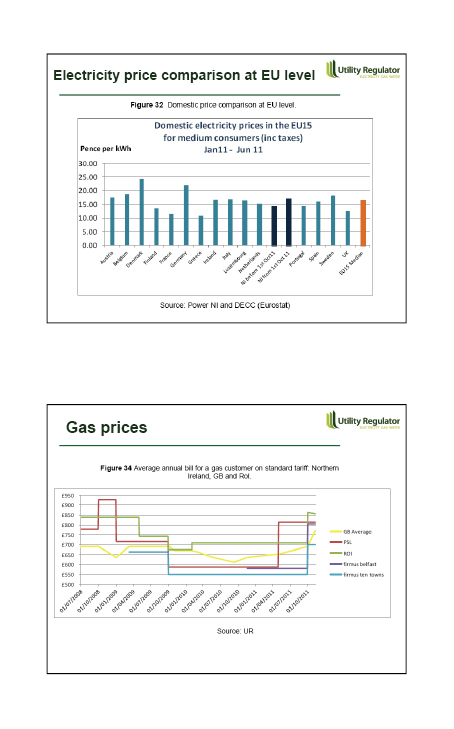
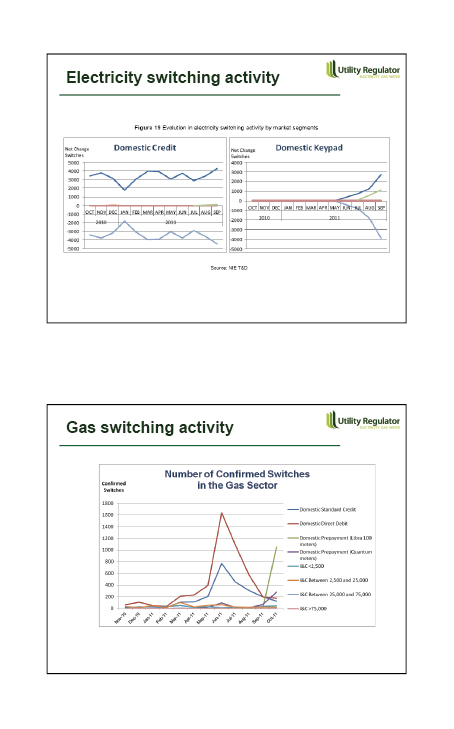
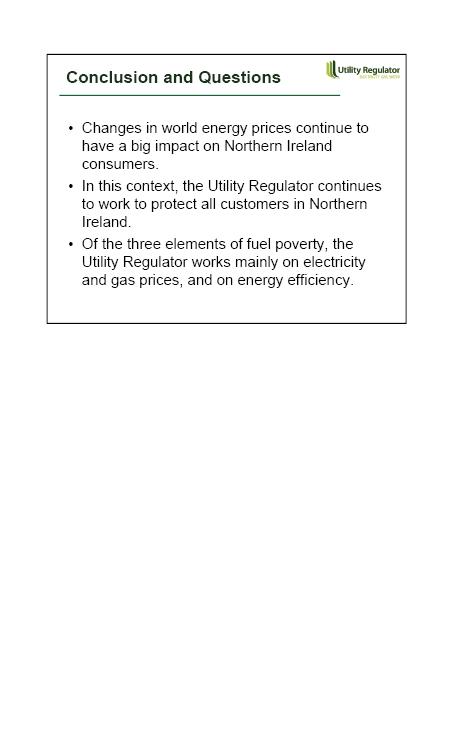
Appendix 4
Thematic Action Groups
TAG 1 – OFMdFM with DSD
Membership: Comprised of stakeholders, officials from OFMdFM and DSD.
Key Theme: Building government, community and voluntary sector capacity forreducing and preventing fuel poverty
TAG 2 – DSD with DHSSPS
Membership: Comprised of stakeholders, officials from DSD with DHSSPS.
Key Theme: Customer engagement around energy efficiency and social inclusion
(could include benefits, lifestyle, budgeting and smart metering)
TAG 3 – DETI with DFP
Membership: Comprised of stakeholders, officials from DETI and DFP.
Key Theme: Energy brokerage and building corporate social responsibility
(Oil, gas, electricity, building regulations, manufacturers etc.)
TAG 4 – DARD with DEL
Membership: Comprised of stakeholders, officials from DARD and DEL
Key Theme: Targeting – tackling and preventing Fuel Poverty using an area-based approach for one-stop service
TAG 5 – DoE with DFP
Membership: Comprised of stakeholders, officials from DoE and DFP.
Key Theme: Developing policy synergies for reducing and preventing fuel poverty
(EPC potential; carbon footprint; engaging high and middle income)
Appendix 5
List of Stakeholders
Table 1
| Organisation: | Represented by: |
|---|---|
| Committee for Social Development | Mr Alex Maskey MLA (Chairperson) |
| Department for Social Development | Ms Heather Cousins Mr Jim Wilkinson Ms Eilish O'Neil |
| Access to Benefits | Mr Patrick Minne Ms Zoe Anderson |
| Citizens Advice Bureau | Mr Derek Alcorn |
| National Energy Action | Ms Pat Austin Mr David Crothers |
| Utility Regulator | Mr Shane Lynch Ms Sarah Brady |
| Rapporteur | Ms Eleanor Murphy |
Table 2
| Organisation: | Represented by: |
|---|---|
| Committee for Enterprise, Trade and Investment | Mr Alban Maginness MLA (Chairperson) |
| Department for Enterprise, Trade and Investment | Ms Fiona Hepper Mr Paul Dolaghan Ms Olivia Martin |
| Bryson Charitable Group | Mr John McMullan Mr Nigel Brady |
| Housing Rights Service | Ms Nicola McCrudden Ms Ruth Barry |
| Irish Congress of Trade Unions | Ms Pauline Buchanan |
| NI Oil Federation | Mr David Blevings Mr Paul Hackett |
| Rapporteur | Mr Aidan Stennett |
Table 3
| Organisation: | Represented by: |
|---|---|
| Committee for the Office of the First Minister and deputy First Minister | Mr Mike Nesbitt MLA |
| Department for the Office of the First Minister and deputy First Minister | Mr Joe Reynolds |
| Age Sector Platform | Mr Eddie Lynch Mr Francis Hughes |
| Consumer Council | Ms Antoinette McKeown Mr John French |
| Older Peoples Advocate | Ms Kate McCullough Ms Donna Heaney |
| Save the Children | Ms Anne Moore |
| Rapporteur | Ms Jane Campbell |
Table 4
| Organisation: | Represented by: |
|---|---|
| Committee for Agriculture and Rural Development | Mr Paul Frew MLA (Chairperson) |
| Department for Agriculture and Rural Development | Mr Keith Morrison Mr Paul Donnelly |
| Energy Savings Trust | Mr Patrick Thompson |
| Firmus Energy | Mr Michael Scott Mr Gary Swan |
| Methodist Church | Rev Billy Davison Mr Norman Hamilton |
| Ulster Farmers Union | Mr Harry Sinclair Ms Ruth Irvine |
| Rapporteur | Mr Mark Allen |
Table 5
| Organisation: | Represented by: |
|---|---|
| Committee for Health, Social Services and Public Safety | Ms Michelle Gildernew MLA (Chairperson) |
| Department for Health, Social Services and Public Safety | Dr Naresh Chada |
| Advice NI | Mr Bob Stronge |
| NI Housing Council | Mr James Brown Cllr Jenny Palmer |
| Macmillan Cancer Support | Ms Heather Monteverde |
| Public Health Agency | Dr Eddie Rooney Ms Colette Rogers |
| Rapporteur | Ms Janice Thompson |
Table 6
| Organisation: | Represented by: |
|---|---|
| Committee for the Environment | Ms Anna Lo MBE MLA (Chairperson) |
| Department for the Environment | Mr Tim Irwin Mr Brendan Forde |
| Age NI | Ms Anne O'Reilly |
| Chartered Institute of Environmental Health | Mr Gary McFarlane |
| Chartered Institute of Housing NI | Ms Jennifer Donald Mr David Little |
| NI Green New Deal Group | Mr John Woods |
| Rapporteur | Mr Des McKibbin |
Table 7
| Organisation: | Represented by: |
|---|---|
| Committee for Finance and Personnel | Mr Conor Murphy MLA (Chairperson) |
| Department for Finance and Personnel | Mr Seamus McCrystal |
| NI Federation for Housing Associations | Mr Christopher Williamson Ms Lucinda McMurran |
| NI Housing Executive | Mr Stewart Cuddy Mr Noel Rice |
| Phoenix Gas | Mr David Strahan |
| Power NI | Mr Stephen McCully Ms Jenny Livingstone |
| Rapporteur | Ms Claire McCanny |
Table 8
| Organisation: | Represented by: |
|---|---|
| Committee for Employment and Learning | Mr Basil McCrea MLA (Chairperson) |
| Department for Employment and Learning | Ms June Ingram |
| Disability Action | Mr Kevin Doherty |
| NI Catholic Council for Social Affairs | Fr Tim Bartlett Mr Malachy McKernan |
| NI Council for Voluntary Action | Ms Lorraine Boyd |
| Rural Community Network | Mr Michael Hughes Mr Aidan Campbell |
| Rapporteur | Ms Fiona McConnell |
